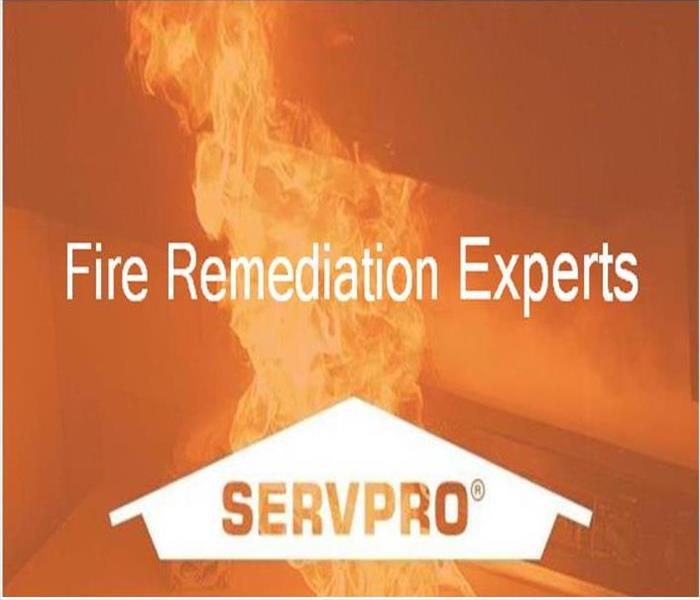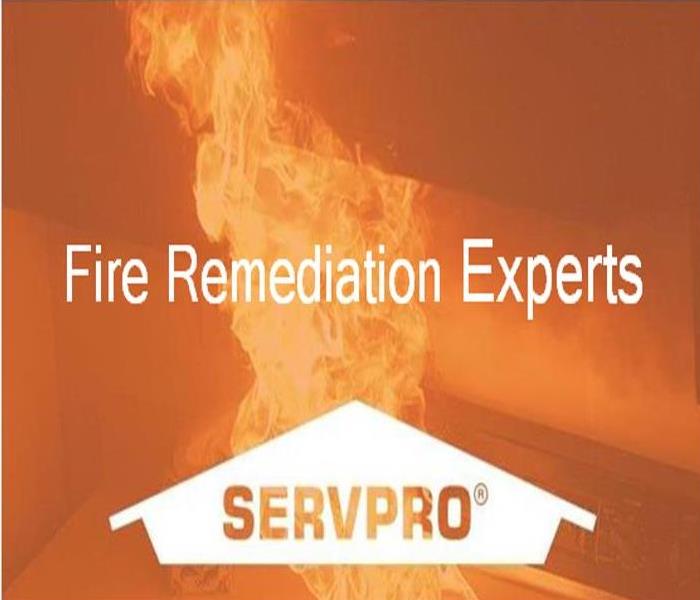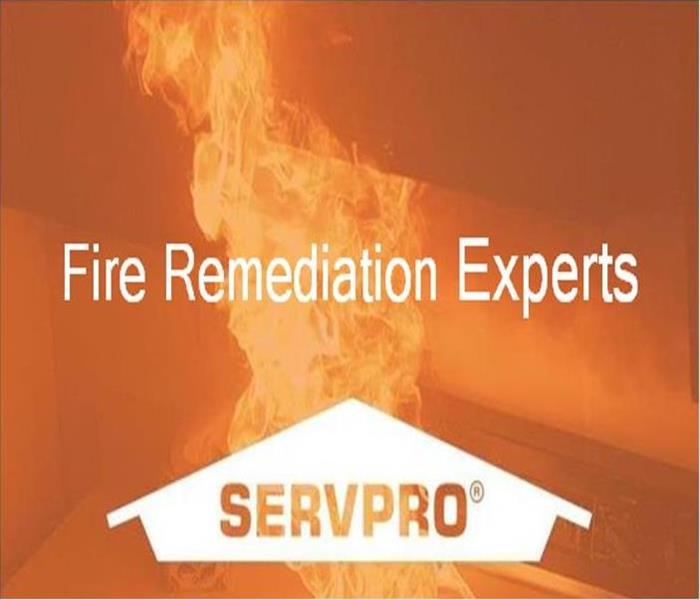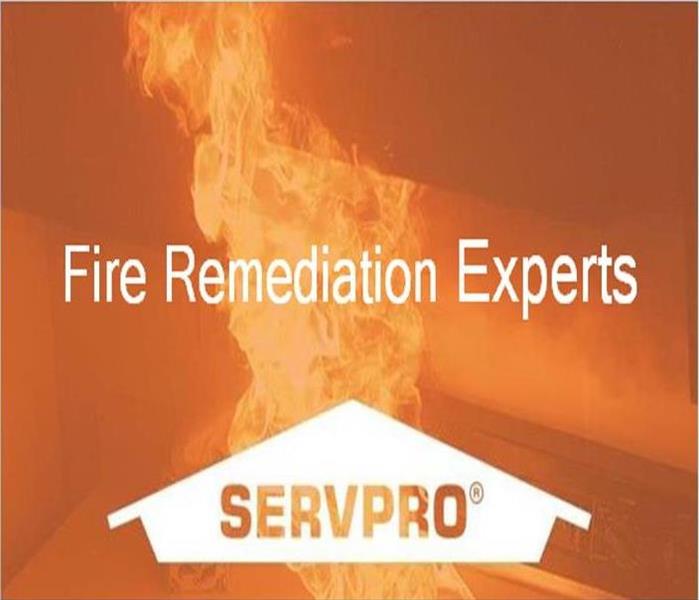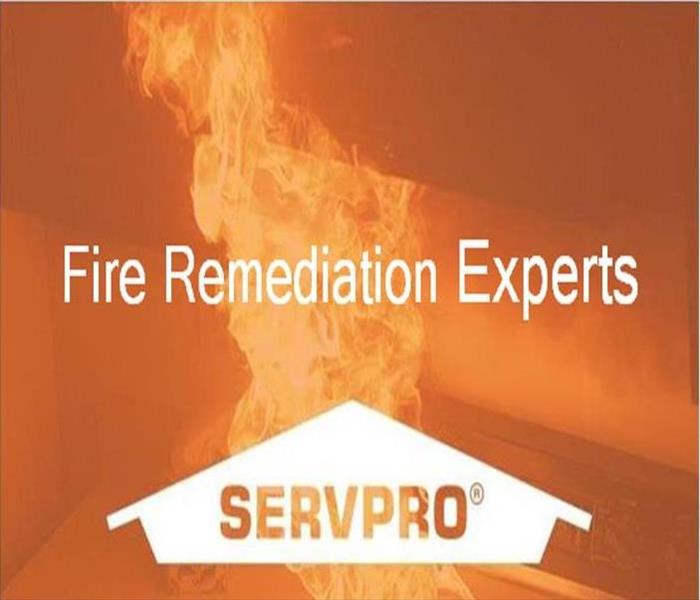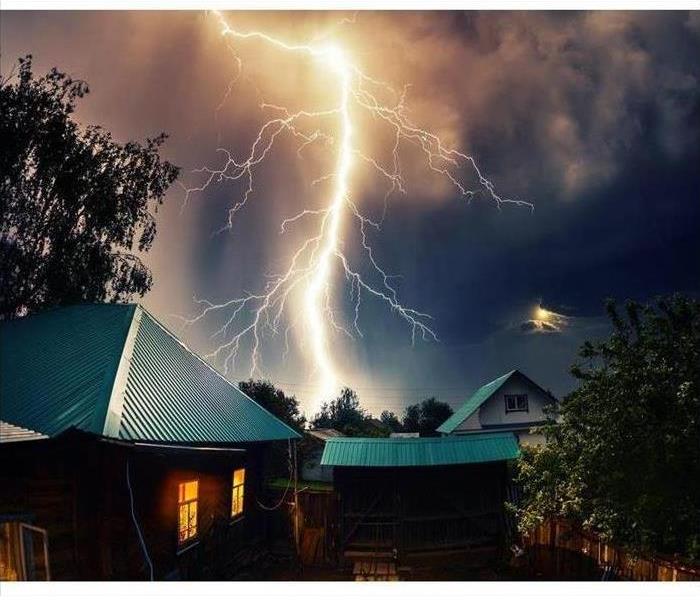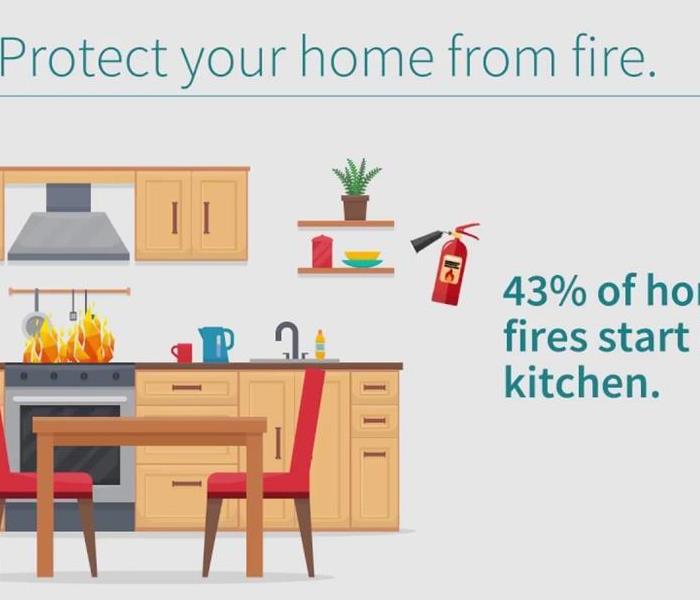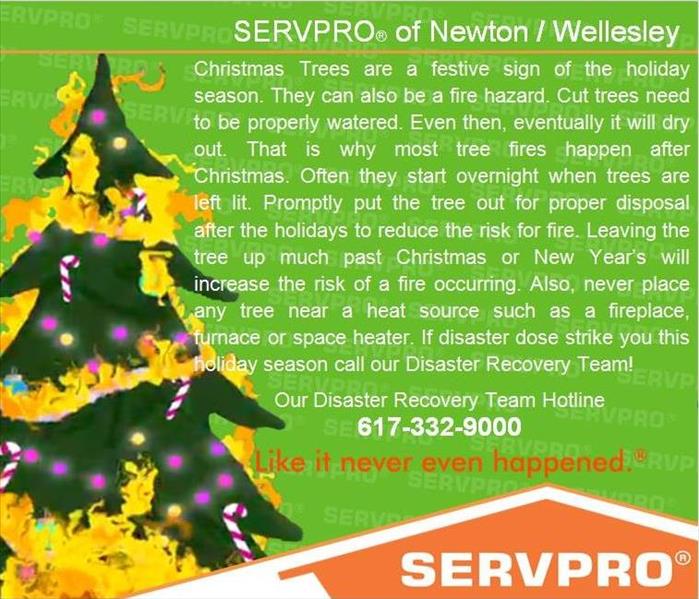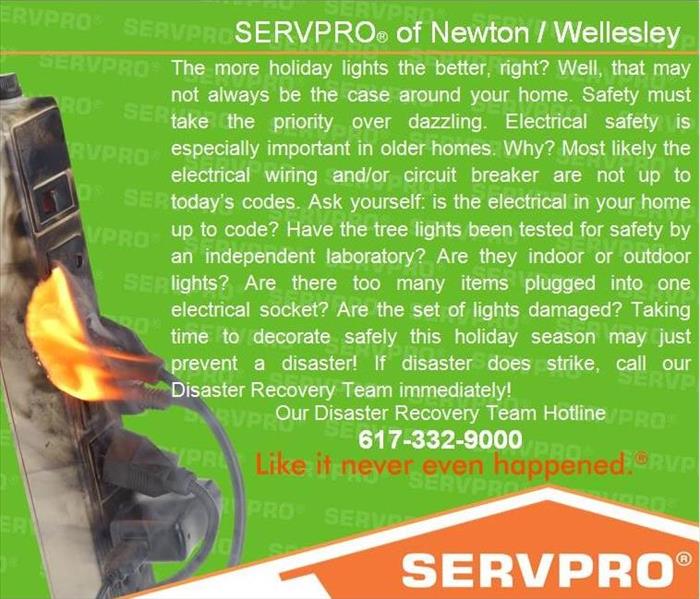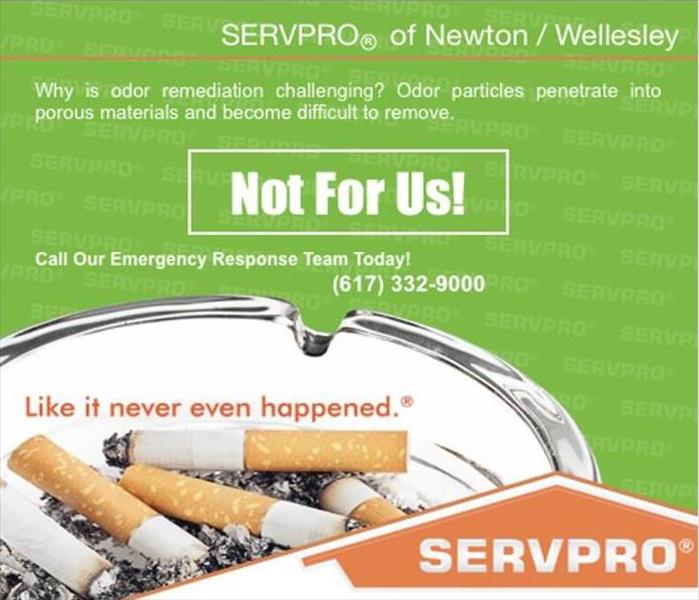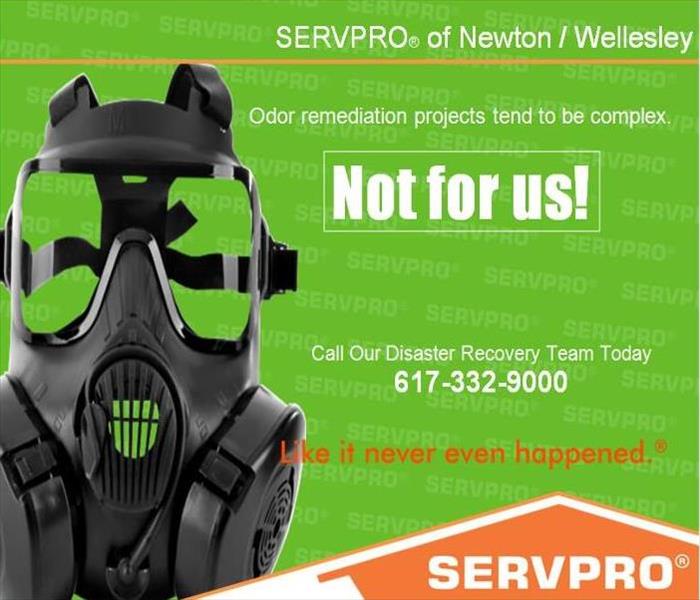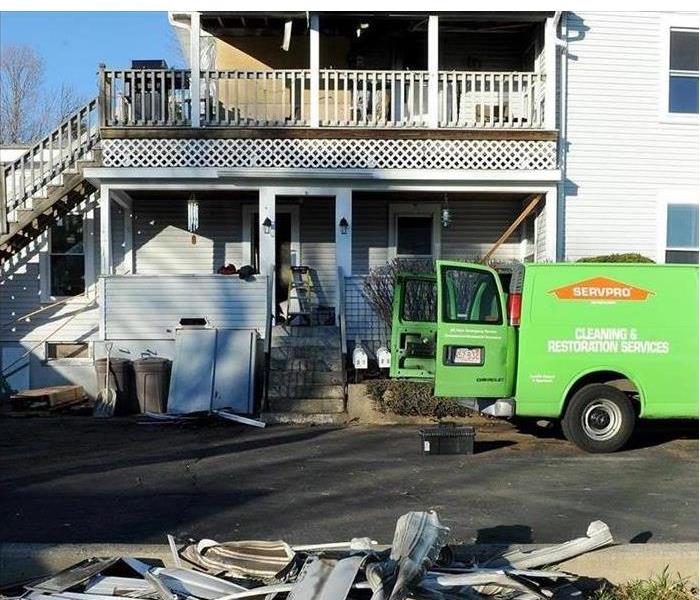Recent Fire Damage Posts
Essential Fire Prevention Tips for Homes and Businesses
2/20/2025 (Permalink)
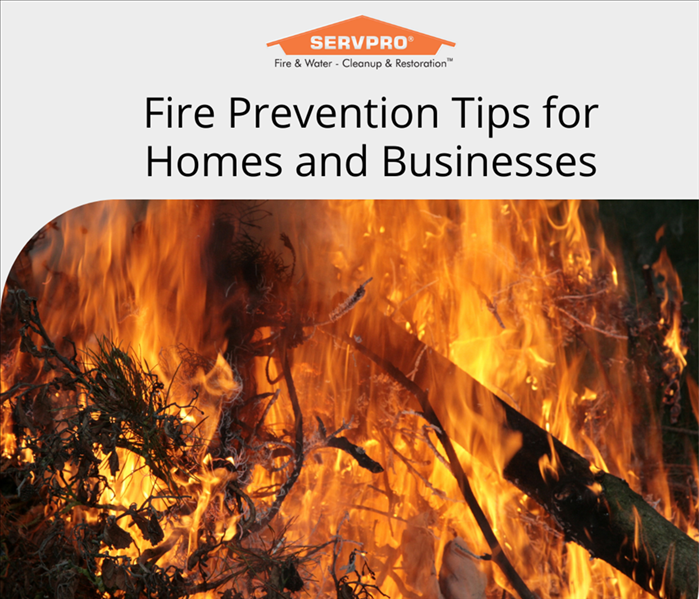 Fire safety is a top priority for both homeowners and business owners.
Fire safety is a top priority for both homeowners and business owners.
Fire safety is a top priority for both homeowners and business owners. Taking proactive steps to prevent fires can protect your property, loved ones, and employees from devastating losses. Follow these essential fire prevention tips to safeguard your home or business.
1. Install and Maintain Smoke Alarms
Why It Matters: Smoke alarms provide early warnings that save lives and reduce property damage.
- For Homes: Install smoke alarms in every bedroom, outside sleeping areas, and on every level.
- For Businesses: Place alarms in high-risk areas like kitchens, break rooms, and storage spaces.
- Maintenance Tip: Test alarms monthly, replace batteries yearly, and install new units every 10 years.
2. Practice Safe Cooking Habits
Why It Matters: Cooking is a leading cause of house fires and injuries.
- Never leave food unattended while cooking.
- Keep flammable materials—like towels and paper—away from stovetops.
- For Businesses: Train kitchen staff on fire safety and equipment use.
3. Use Electrical Systems Safely
Why It Matters: Faulty wiring and overloaded circuits are major fire hazards.
- Avoid overloading power outlets and extension cords.
- Check for damaged or frayed cords and replace them immediately.
- Hire licensed electricians for routine inspections and repairs.
4. Store Flammable Materials Properly
Why It Matters: Flammable liquids and materials can ignite easily if not stored correctly.
- Store flammable substances in their original containers, away from heat sources.
- For Businesses: Follow OSHA guidelines for handling and storing flammable materials.
5. Create and Practice a Fire Escape Plan
Why It Matters: A well-prepared plan can save lives in an emergency.
- For Homes: Develop an escape plan with two exits per room and a designated meeting spot. Practice with your family.
- For Businesses: Implement an emergency action plan, conduct regular fire drills, and post clear evacuation routes.
6. Use Heating Equipment Safely
Why It Matters: Space heaters and fireplaces are common causes of winter fires.
- Keep space heaters at least three feet from flammable objects.
- Have chimneys and fireplaces professionally cleaned and inspected annually.
7. Install Fire Suppression Systems
Why It Matters: Fire extinguishers and sprinklers can stop small fires before they spread.
- Keep fire extinguishers in accessible areas throughout your property.
- For Businesses: Invest in automatic sprinkler systems for enhanced fire protection.
Fire Damage Restoration and Recovery
Despite the best precautions, fires can still occur. If you experience fire damage, professional restoration services can help with:
- Smoke and soot cleanup
- Odor removal
- Structural repairs
Stay proactive with fire prevention to protect your home or business. If fire damage occurs, expert restoration services can help you recover quickly and safely.
As a trusted leader in the restoration industry, SERVPRO of Newton / Wellesley has the advanced training and equipment needed to restore your home and business.
Fire Damage: Steps to Take Before Help Arrives
1/16/2025 (Permalink)
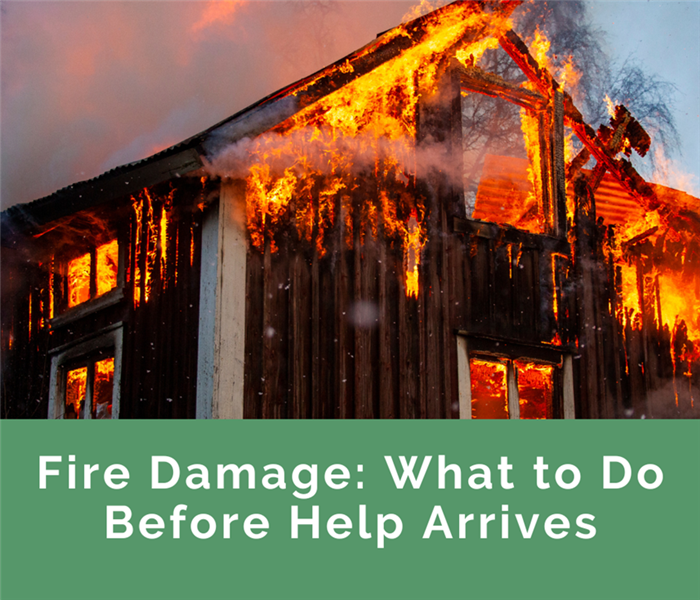 Experiencing a fire can be overwhelming, but taking the right actions afterward can make a significant difference.
Experiencing a fire can be overwhelming, but taking the right actions afterward can make a significant difference.
Experiencing a fire can be overwhelming, but taking the right actions afterward can make a significant difference.
Follow this guide to address fire damage safely while waiting for professional assistance.
1. Prioritize Safety
Your safety is paramount. Do not re-enter the property until the fire department declares it safe. Be aware of potential hazards such as structural instability, lingering smoke, and electrical dangers.
2. Document the Damage
When it’s safe to do so, take clear photos and videos of the fire damage. This documentation will be crucial for your insurance claim and help ensure you receive the compensation you deserve.
3. Avoid Cleaning on Your Own
Fire damage requires specialized cleaning techniques. Attempting to clean smoke or soot yourself can inadvertently spread contaminants or worsen the damage. Leave the restoration to trained professionals.
4. Trust the Experts
When our team arrives, we’ll assess the damage, develop a detailed restoration plan, and begin cleaning, deodorizing, and repairing your property. Our specialists are equipped to handle even severe fire damage efficiently and effectively.
As a trusted leader in the restoration industry, SERVPRO of Newton/Wellesley combines advanced training with state-of-the-art equipment to restore your home or business to its pre-fire condition.
Home Restoration 101: Recovering from Holiday Cooking Mishaps and Kitchen Fires
12/4/2024 (Permalink)
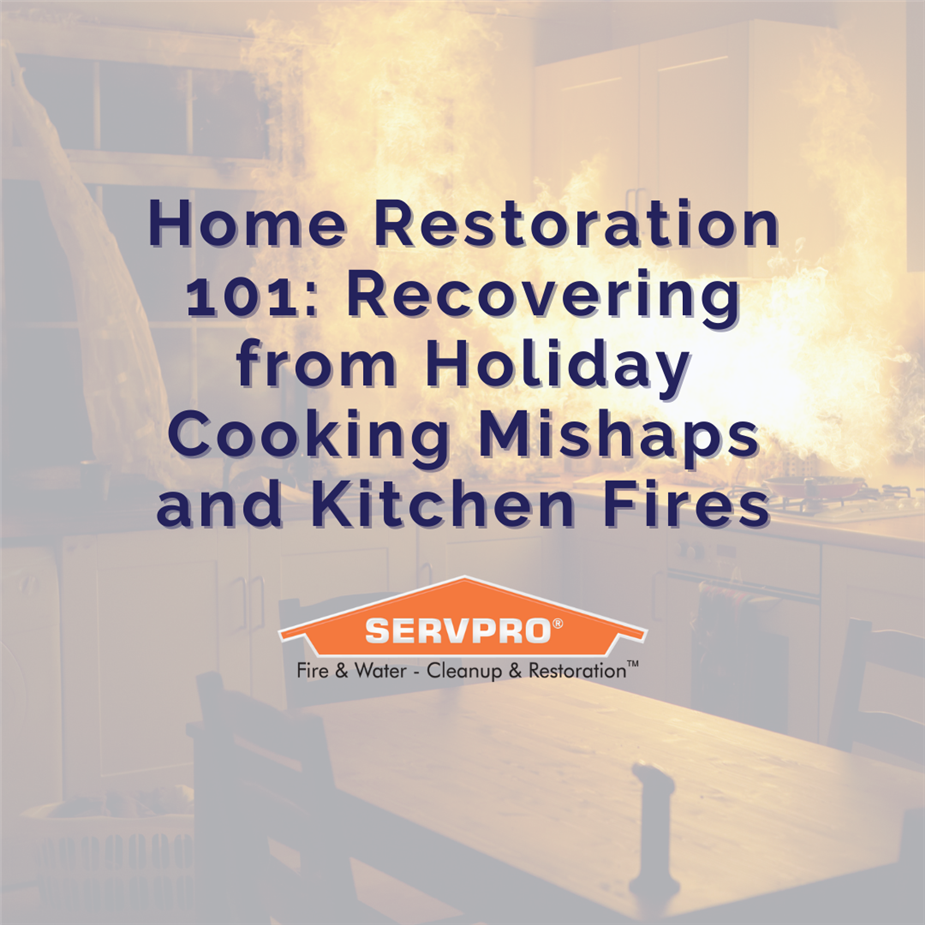 With advanced training and equipment, we’re ready to restore your kitchen and home after any holiday mishap. Contact us at (617) 332-9000.
With advanced training and equipment, we’re ready to restore your kitchen and home after any holiday mishap. Contact us at (617) 332-9000.
The holiday season brings joyful gatherings, delicious meals, and unfortunately, a higher risk of kitchen accidents. With the increased hustle and bustle, small cooking mishaps or even kitchen fires can happen. Knowing how to prevent, respond to, and recover from these incidents can save time, stress, and expense. Here’s your guide to ensuring a safe holiday kitchen and effectively managing any unexpected damage.
Preventing Holiday Cooking Fires
Before discussing restoration, let’s focus on avoiding cooking fires altogether. These key precautions can help:
1. Stay Present and Focused
Holiday distractions can easily lead to accidents. Never leave a hot stovetop or oven unattended. If you must step away, turn off the heat.
2. Wear Safe Cooking Attire
Avoid loose clothing or long sleeves that can catch fire. Choose snug-fitting clothing or roll up your sleeves while cooking.
3. Keep Flammables Away from Heat
Store towels, paper products, and wooden utensils far from stovetops and ovens. A tidy workspace reduces fire risks.
4. Have a Fire Extinguisher Handy
Keep a fire extinguisher nearby, ensuring it’s rated for kitchen use. Familiarize yourself with its operation in advance.
5. Handle Oil and Grease with Care
Hot oil can overheat and ignite quickly. Always watch it closely and never use water to extinguish a grease fire—it will only make it worse.
Responding to a Cooking Fire
Even with precautions, accidents happen. If a fire starts:
Turn Off the Heat Source
For stovetop fires, turn off the burner immediately. For oven fires, shut off the oven and keep the door closed to suffocate flames.
Cover Small Fires
Use a metal lid or baking sheet to smother flames on the stovetop. Never use water, flour, or anything combustible.
Use a Fire Extinguisher
If the fire grows beyond your control, use an extinguisher. Call emergency services if needed.
Ventilate the Kitchen
After extinguishing the fire, open windows and use fans to clear smoke. Avoid using the kitchen vent hood until it’s inspected for damage.
Recovering from Fire or Smoke Damage
If a mishap results in fire or smoke damage, take these steps to restore your kitchen:
1. Assess the Damage
Inspect the area to determine whether the damage is surface-level or requires deeper cleaning or repairs.
2. Remove Soot and Smoke Residue
- Soot: Use a vacuum with a brush attachment to gently remove loose soot from surfaces without smearing it.
- Smoke Residue: Clean walls, counters, and cabinets with a mix of water, vinegar, and mild detergent. Rinse thoroughly.
3. Eliminate Smoke Odors
- Ventilation: Open windows and use fans to circulate fresh air.
- Baking Soda & Vinegar: Sprinkle baking soda on soft surfaces or wipe hard surfaces with vinegar to neutralize odors.
- Air Purifiers: Use devices with HEPA filters or place activated charcoal in the room to absorb lingering smells.
4. Deep Clean Appliances
- Oven & Stovetop: Follow your appliance manual for safe, thorough cleaning. Avoid using abrasive chemicals.
- Vent Hood & Filters: Remove and clean filters to eliminate smoke and grease buildup. Replace them if necessary.
5. Call Professionals for Extensive Damage
If the damage extends to walls, ceilings, or beyond the kitchen, consider hiring restoration experts to address stubborn stains, odors, or structural issues.
6. Repair or Replace Damaged Areas
- Cabinets & Counters: Sand, repaint, or replace burned or stained surfaces.
- Flooring: Address water or fire damage by patching or replacing sections as needed.
Keeping Your Kitchen Safe Year-Round
Prevent future accidents with these habits:
- Regularly clean your oven, stovetop, and vent hood to minimize grease buildup.
- Test smoke detectors monthly to ensure proper functionality.
- Review kitchen safety protocols with family members so everyone knows what to do in an emergency.
Cooking mishaps are common during the holidays, but preparation and quick action can minimize their impact. With these tips, you’ll keep your kitchen safe, restore it effectively if needed, and enjoy a festive season with peace of mind.
Need Restoration Help?
SERVPRO of Newton/Wellesley is a trusted leader in the restoration industry. With advanced training and equipment, we’re ready to restore your kitchen and home after any holiday mishap. Contact us at (617) 332-9000 for expert assistance.
Holiday Cooking Safety: Keep Your Celebrations Fire-Free
11/15/2024 (Permalink)
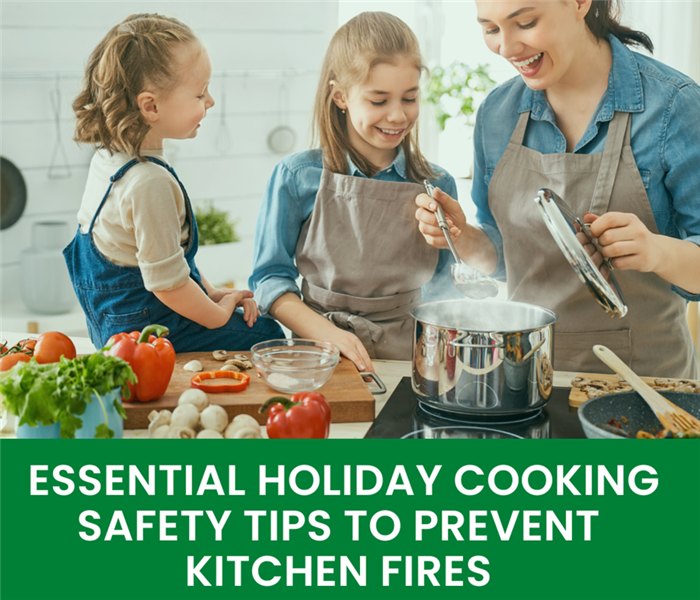 It’s important to stay mindful of kitchen safety to avoid potential fire hazards.
It’s important to stay mindful of kitchen safety to avoid potential fire hazards.
The holiday season is a time for gathering, celebrating, and indulging in delicious meals. But amidst the joy, it’s important to stay mindful of kitchen safety to avoid potential fire hazards. With a little extra care, you can ensure your festivities remain warm and memorable—for all the right reasons!
Here are 6 essential tips to keep your holiday cooking safe:
1. Stay Vigilant in the Kitchen
Unattended cooking is the leading cause of kitchen fires. Always remain in the kitchen while frying, grilling, or simmering food. If you need to step away, turn off the heat. Keep flammable items like oven mitts, towels, and paper products away from stovetops and heat sources.
2. Check Your Smoke Alarms
Before cooking begins, ensure your smoke alarms are operational. Test them by pressing the test button and replace batteries if needed. A functioning smoke alarm can provide critical time to address a fire if it occurs.
3. Avoid Overloading Electrical Outlets
Holiday cooking and décor often demand extra power. Avoid overloading outlets to prevent overheating and potential electrical fires. Use surge protectors to safely manage power distribution.
4. Candle Safety Matters
Candles add a festive touch, but they can be hazardous if not monitored. Place them away from flammable materials like curtains or decorations. Never leave candles unattended, and always extinguish them before leaving the room or going to bed.
5. Deep Frying a Turkey? Use Caution
If deep frying a turkey is on your menu, do so with care. Fry your turkey outdoors on a flat, non-flammable surface, and ensure it’s fully thawed to prevent dangerous oil splatters. Always keep a fire extinguisher nearby.
6. Keep Your Oven and Stove Vents Clean
Grease buildup in ovens and vents can ignite easily. Regularly clean these areas, including your stove hood filters, to minimize the risk of grease fires.
By following these tips, you’ll set the stage for a safe and joyous holiday cooking experience. Prevention is the best gift you can give yourself and your loved ones this season.
Should the unexpected happen, SERVPRO of Newton/Wellesley is here to help. As a trusted leader in fire and restoration services, we’re ready to assist with advanced training and equipment to restore your home or business. Call us at (617) 332-9000 for expert support.
Happy Holidays, and stay safe in the kitchen!
Fire Prevention in Commercial Buildings: Protect Your Business During Heating Season
11/6/2024 (Permalink)
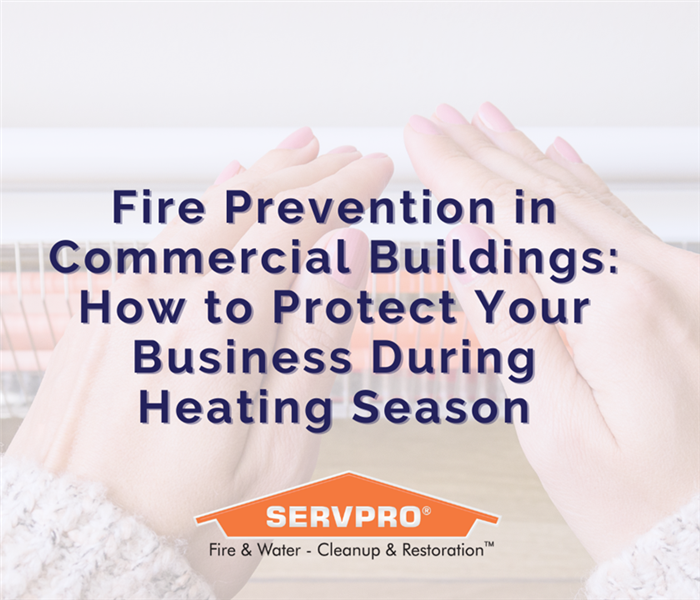 As the temperature drops and heating systems kick into high gear, the fire risk in commercial buildings rises.
As the temperature drops and heating systems kick into high gear, the fire risk in commercial buildings rises.
As the temperature drops and heating systems kick into high gear, the fire risk in commercial buildings rises. Heating equipment, space heaters, and electrical malfunctions are common fire hazards during the colder months. For business owners, proactive fire prevention is essential to protect both property and employees. Below, we’ll cover key fire risks during heating season and provide actionable tips to help keep your business safe.
Common Fire Risks During Heating Season
Understanding heating season fire risks can help you better prepare your commercial property. Here are some common hazards:
Heating Systems
Heating systems, while essential, can pose fire hazards if not properly maintained. Malfunctioning furnaces, boilers, and heat pumps can overheat, leak gas, or cause electrical fires. Dust accumulation on heating elements and blocked vents also heighten fire risks.
Space Heaters
Space heaters are popular for supplementing heat, especially in spaces where central heating doesn’t fully reach. However, they contribute to numerous workplace fires each year, often due to overheating, tipping over, or igniting nearby materials like paper or furniture.
Electrical Malfunctions
Increased use of heating equipment strains your building’s electrical load, making electrical fires a major concern during heating season. Faulty wiring, overloaded circuits, and damaged cords can all spark fires, particularly in older buildings with outdated electrical systems.
Flammable Materials Near Heat Sources
Storing flammable items like cleaning supplies, paper, or chemicals too close to heating systems, furnaces, or space heaters can quickly turn a small spark into a large fire.
Fire Prevention Tips for Business Owners
Preventing fires requires regular maintenance, employee training, and safety protocols. Here’s how to reduce fire risks in your commercial property during heating season:
Schedule Regular Heating System Inspections
Have a licensed HVAC professional inspect and service your building’s heating system annually. This ensures efficiency and safety, as technicians can spot potential risks like gas leaks or clogged vents.
- Clean Filters and Vents: Clogged filters can cause overheating, so regularly clean or replace them to ensure safe airflow.
- Test Smoke and Carbon Monoxide Detectors: Make sure detectors near heating equipment are functional, as they provide early fire or gas leak warnings.
Set Space Heater Safety Guidelines
If your business uses space heaters, establish safety rules to prevent accidents.
- Certified Heaters Only: Use heaters certified by recognized labs (like UL or ETL) with safety features like tip-over shut-offs.
- Keep Heaters Clear of Flammables: Position heaters at least three feet away from combustible materials, such as paper, curtains, or furniture.
- Turn Off When Unattended: Ensure space heaters are off when rooms are empty or at the end of the workday. Models with automatic timers are ideal for added safety.
- Use Proper Outlets: Plug heaters directly into wall outlets to avoid circuit overloads that power strips or extension cords might cause.
Conduct Electrical Safety Checks
With increased heating use, make sure your building’s wiring can handle the load.
- Inspect Outlets and Cords: Look for frayed cords, loose outlets, or other wear. Damaged cords should be replaced immediately.
- Monitor Electrical Load: Avoid overloading circuits and consider an electrician’s load test to ensure your system is code-compliant.
- Install Ground Fault Circuit Interrupters (GFCIs): These protect against electrical shocks and fires, especially in damp areas.
Create a Fire-Safe Workspace
Reduce potential fire hazards with these safety practices:
- Clear Combustible Clutter: Keep flammable materials, like paper or cleaning supplies, away from heat sources and outlets.
- Designate a Smoking Area: Ensure any smoking area is outside and away from the building, with proper cigarette disposal containers to reduce fire risks.
- Ensure Accessible Fire Extinguishers: Place extinguishers in high-risk areas and make sure employees are trained in using them.
Train Employees on Fire Safety
Fire safety training is crucial for prevention and response. Include these essentials:
- Using a Fire Extinguisher: Teach employees the PASS method (Pull, Aim, Squeeze, Sweep) to operate extinguishers correctly.
- Evacuation Procedures: Communicate a clear evacuation plan, including exit locations and assembly points, and practice fire drills regularly.
- Hazard Reporting: Encourage employees to report potential fire risks, such as faulty cords or heating equipment issues.
With heating season comes an increased fire risk in commercial buildings. By scheduling heating system inspections, setting space heater safety guidelines, conducting electrical checks, and fostering a fire-safe workspace, you can help protect your business from the devastation of a fire.
Take Action Today
Fire prevention is all about preparation. Routine maintenance, employee awareness, and adherence to safety protocols can protect your business. Don’t wait until an emergency happens—start implementing these fire safety tips today to ensure a safe heating season.
If you need assistance preparing your commercial property for fire safety this winter, our team is ready to help with fire risk assessments, inspections, and preventive maintenance. Contact us to learn more about how we can safeguard your business this season.
SERVPRO of Newton/Wellesley
As a trusted leader in the restoration industry, SERVPRO of Newton/Wellesley provides the training and equipment necessary to restore your business or home. Contact us at (617) 332-9000.
How Candles Can Cause Fires and How to Prevent Them
10/18/2024 (Permalink)
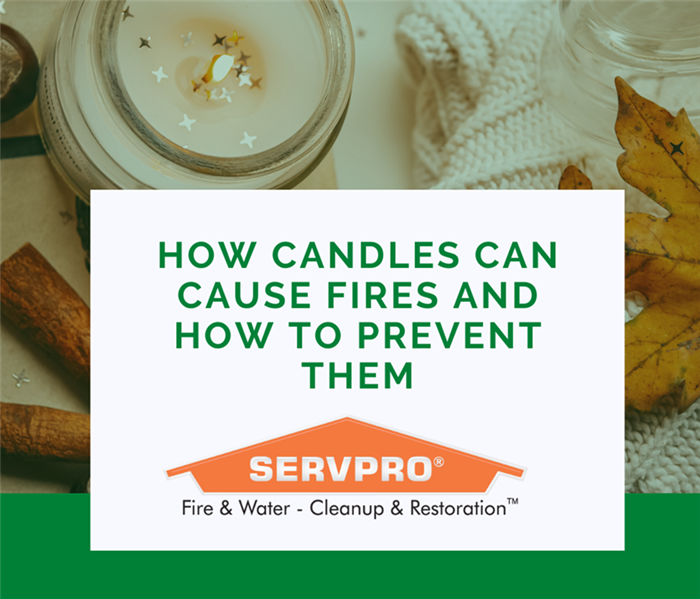 Understanding the risks and learning how to use candles safely is crucial for preventing potential fires.
Understanding the risks and learning how to use candles safely is crucial for preventing potential fires.
Candles create a warm, inviting atmosphere, making them a popular choice for lighting, decoration, and relaxation. However, despite their beauty and charm, candles can also pose serious fire hazards if not used properly. Understanding the risks and learning how to use candles safely is crucial for preventing potential fires. Here’s a comprehensive look at how candles can cause fires and how you can mitigate these risks.
1. How Candles Can Cause Fires
Candles are a common source of residential fires. Here are some of the main ways they can become dangerous:
- Unattended Flames: One of the most common causes of candle-related fires is leaving candles unattended. A candle’s flame can easily ignite nearby flammable materials if not watched closely.
- Improper Placement: Placing candles near combustible materials like curtains, paper, or furniture can lead to a fire. Candles should always be placed on a stable, heat-resistant surface away from anything that could catch fire.
- Overuse of Decorative Candles: Candles with decorative elements like leaves, feathers, or ribbons can catch fire if they get too close to the flame. These decorations can be highly flammable and should be avoided or used with caution.
- Failure to Trim Wicks: A wick that’s too long can cause a candle to burn too hot and lead to excessive flame height. This increases the risk of the candle catching nearby materials on fire. It’s essential to trim the wick to about ¼ inch before each use.
- Old or Damaged Candles: Candles that are old or have been improperly stored can become unstable. Cracked or damaged candles can cause uneven burning and increase the risk of fire.
2. Safety Tips for Using Candles
To enjoy the ambiance of candles without compromising safety, follow these important tips:
- Never Leave a Candle Unattended: Always keep an eye on burning candles. Extinguish them before leaving the room or going to sleep.
- Use Candle Holders: Place candles in sturdy, heat-resistant holders that are designed to catch wax drips and contain the flame. Ensure the holder is on a stable, non-flammable surface.
- Keep Candles Away from Flammable Items: Ensure that candles are placed away from curtains, paper, bedding, and other flammable materials. Avoid placing candles in areas where they can be easily knocked over.
- Keep Out of Reach of Children and Pets: Children and pets can accidentally knock over candles or get too close to the flame. Keep candles in locations that are out of their reach.
- Trim Wicks Regularly: Before lighting a candle, trim the wick to about ¼ inch. This helps to control the size of the flame and reduces the risk of a large, uncontrolled fire.
- Extinguish Candles Safely: Use a candle snuffer to extinguish the flame rather than blowing it out, which can spread hot wax. Make sure the candle is completely out and the wick is no longer glowing before leaving it unattended.
3. Alternative Options
If you’re concerned about the risks of traditional candles, consider these safer alternatives:
- Battery-Operated Candles: LED candles offer the appearance of real candles without the fire risk. They can be used safely in many settings and often come with timers and remote controls.
- Electric Wax Warmers: These devices melt wax without a flame, providing the pleasant scent of a candle without the fire risk.
- Scented Oil Diffusers: For a fragrance boost, consider using an oil diffuser. These devices disperse essential oils into the air and are generally safer than burning candles.
4. What to Do in Case of a Candle-Related Fire
In the event of a candle-related fire, act quickly:
- Evacuate Immediately: If a fire occurs, get out of the building as quickly and safely as possible.
- Call 911: Once you are in a safe location, call emergency services to report the fire.
- Do Not Try to Extinguish Large Fires: Leave the firefighting to professionals. Focus on getting yourself and others to safety.
Candles add a touch of elegance and warmth to any environment, but they come with inherent risks. By following safety guidelines and considering alternative products, you can enjoy the beauty of candles while minimizing the risk of fire.
SERVPRO of Newton / Wellesley is your comprehensive solution for residential and commercial restoration and cleaning services. Our highly trained technicians are available 24/7 to address any water, fire, or storm damage in Newton, Wellesley, Needham, Waban, MA, and surrounding areas.
Fire Safety Week: Essential Tips to Keep Your Home and Family Safe
9/27/2024 (Permalink)
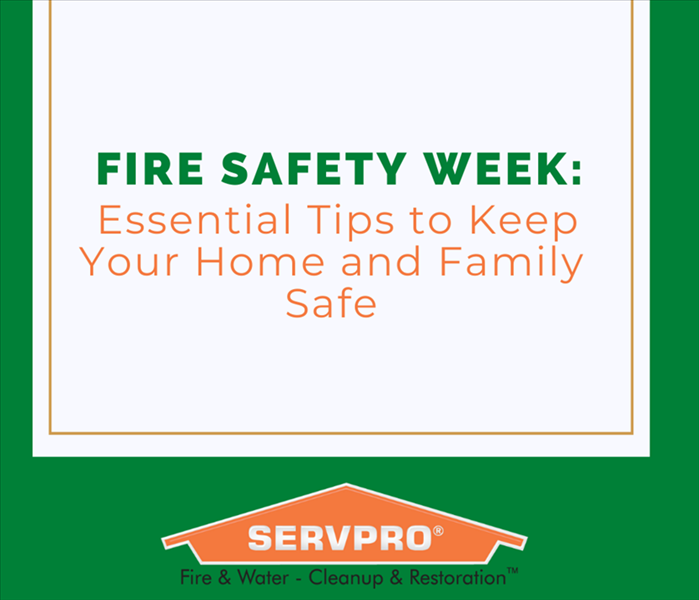 By taking the time to check alarms, create a fire escape plan, and follow these safety tips, you can make your home a safer place for you.
By taking the time to check alarms, create a fire escape plan, and follow these safety tips, you can make your home a safer place for you.
Fire Safety Week is an annual campaign dedicated to educating families and communities about fire hazards and how to prevent them in Newton. This year’s theme emphasizes the importance of preparation and being proactive regarding fire safety. By understanding the risks and implementing key safety measures, you can protect your loved ones and home from potential disasters. Here’s how you can take action this Fire Safety Week.
1. Check Your Smoke Alarms
Smoke alarms are your first defense against a fire, providing early warnings that give you and your family crucial time to escape. Here’s what you need to do:
- Test alarms regularly: Test all smoke alarms in your home once a month to ensure they function correctly.
- Change the batteries: Replace the batteries in your smoke alarms at least once a year. A good rule of thumb is to change them when you change your clocks for daylight saving time.
- Install alarms in key areas: Every bedroom, hallway, and level of your home should have a smoke alarm.
2. Create a Family Fire Escape Plan
In a fire, every second counts. Having a clear escape plan can save lives. Take time to:
- Identify two exits per room: If one exit is blocked, having a second way out is essential.
- Designate a meeting spot: Choose a safe place outside, away from the house, where everyone should meet in case of a fire.
- Practice regularly: Conduct fire drills with your family at least twice a year so everyone knows what to do in an emergency.
3. Stay Safe in the Kitchen
Cooking is the leading cause of home fires. Here are some simple precautions to prevent kitchen fires:
- Never leave cooking unattended: If you must leave the kitchen, turn off the stove or have someone watch over the cooking.
- Keep flammable objects away from the stove: This includes dish towels, paper towels, and oven mitts.
- Have a fire extinguisher nearby: Know how to use it properly in case of a small fire.
4. Practice Space Heater Safety
As colder weather approaches, space heaters become a common fire risk. Follow these tips to stay warm safely:
- Keep space heaters at least 3 feet away from anything flammable. This includes furniture, curtains, and bedding.
- Turn off heaters when you leave the room or go to bed. Never leave them unattended.
5. Stop Fires Before They Start
While we can't predict when or where a fire will break out, we can reduce the chances by taking proactive steps:
- Keep your home clutter-free: Especially around areas that are prone to fires, like the kitchen and around electrical outlets.
- Check electrical cords: Damaged or frayed wires can cause sparks and lead to fires. Replace cords immediately if you see wear and tear.
- Store flammable materials safely: Items like gasoline, cleaning supplies, and aerosol cans should be kept in well-ventilated areas, away from heat sources.
6. Use Candles Responsibly
While candles can create a cozy atmosphere, they’re also a common fire hazard. If you use candles, be sure to:
- Blow them out before leaving the room. Never leave a candle unattended, especially if children or pets are present.
- Use sturdy candle holders. Make sure the holder is on a flat, stable surface, and away from flammable objects.
Fire Prevention Week is a perfect opportunity to focus on fire safety. By taking the time to check alarms, create a fire escape plan, and follow these safety tips, you can make your home a safer place for you and your loved ones in Newton.
SERVPRO of Newton / Wellesley is your comprehensive solution for residential and commercial restoration and cleaning services. Our highly trained technicians are available 24/7 to address any water, fire, or storm damage in Newton, Wellesley, Needham, Waban, MA, and surrounding areas.
The Do’s and Don’ts of Fall Leaf Burning
9/7/2024 (Permalink)
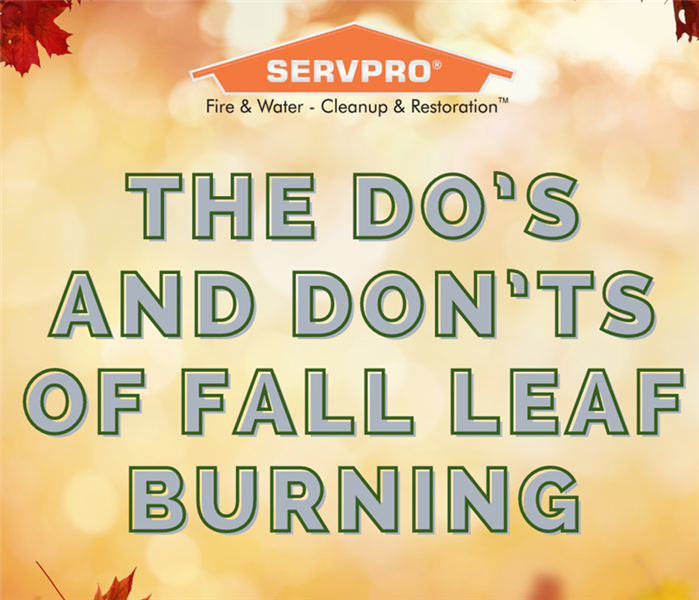 Here’s a guide to help you burn your leaves safely and responsibly in Newton.
Here’s a guide to help you burn your leaves safely and responsibly in Newton.
As the leaves begin to change color and fall, many homeowners find themselves with an abundance of leaves in their yards. While some opt for composting or mulching, others choose to burn their leaves. If you’re considering burning your leaves this fall, it’s crucial to do so safely. Improper leaf burning can lead to wildfires, air pollution. Here’s a guide to help you burn your leaves safely and responsibly in Newton.
The Do’s of Leaf Burning
- Check Local Regulations: Before you even consider burning leaves, it’s important to check your local laws and regulations. Some municipalities have strict rules or outright bans on leaf burning due to environmental concerns or fire risks. Always verify if a permit is needed and understand the guidelines you must follow.
- Choose a Safe Location: Pick a location that’s far from your home, sheds, fences, trees, or any other structures. Ensure there’s at least a 50-foot distance between the burning area and any buildings or flammable materials. A flat, open area with little wind is ideal.
- Create a Firebreak: A firebreak is a barrier that prevents the spread of fire. Surround your burn area with a firebreak made of bare soil or non-flammable materials, such as gravel. This helps contain the fire and keeps it from spreading to unintended areas.
- Burn on a Calm, Dry Day: Wind can cause embers to spread quickly, so only burn on a day with little to no wind. Additionally, wet leaves don’t burn well and can create excessive smoke, so choose a dry day for burning.
- Have Water and Tools Ready: Always have a hose, buckets of water, or a fire extinguisher nearby in case the fire gets out of control. A rake or shovel can also help you manage the fire by spreading out the leaves or smothering any rogue flames.
The Don’ts of Leaf Burning
- Don’t Burn Large Piles: Burning a large pile of leaves can be difficult to control. Instead, burn small piles, adding more leaves as the previous ones burn down. This will make it easier to manage the fire and reduce the risk of it spreading.
- Don’t Burn Near Vegetation or Wooded Areas: Burning leaves too close to trees, bushes, or other vegetation can cause the fire to spread quickly. Always maintain a safe distance from any vegetation to prevent accidental wildfires.
- Don’t Leave the Fire Unattended: Never leave a burning pile of leaves unattended. Stay with the fire at all times, and only burn as much as you can monitor. If you need to step away, extinguish the fire completely before doing so.
- Don’t Burn in High Winds or During a Drought: Wind can carry embers far beyond your burn area, potentially igniting other areas. Similarly, dry conditions during a drought increase the likelihood of wildfires. Avoid burning leaves under these conditions to prevent accidental fires.
- Don’t Use Accelerants: Using gasoline, lighter fluid, or other accelerants to start or maintain your fire is dangerous. These substances can cause the fire to become uncontrollable, leading to serious accidents or injuries. Stick to natural methods, such as matches or a lighter, to start your fire.
Alternative Leaf Disposal Methods
If burning leaves seems too risky, consider these safer alternatives:
- Composting: Turn your leaves into nutrient-rich compost for your garden. Over time, they’ll break down and create a valuable soil amendment.
- Mulching: Shred the leaves and use them as mulch around your plants and trees. This not only recycles the leaves but also helps retain moisture in the soil and suppresses weeds.
- Municipal Collection: Many towns offer curbside leaf collection services. Check with your local government to see if this is an option for you.
Burning leaves can be a convenient way to deal with autumn’s bounty, but it comes with risks.
SERVPRO of Newton / Wellesley is your comprehensive solution for residential and commercial restoration and cleaning services. Our highly trained technicians are available 24/7 to address any water, fire, or storm damage in Newton, Wellesley, Needham, Waban, MA, and surrounding areas.
Fire Safety During Summer Storms: Tips to Protect Your Property in Needham, MA
8/19/2024 (Permalink)
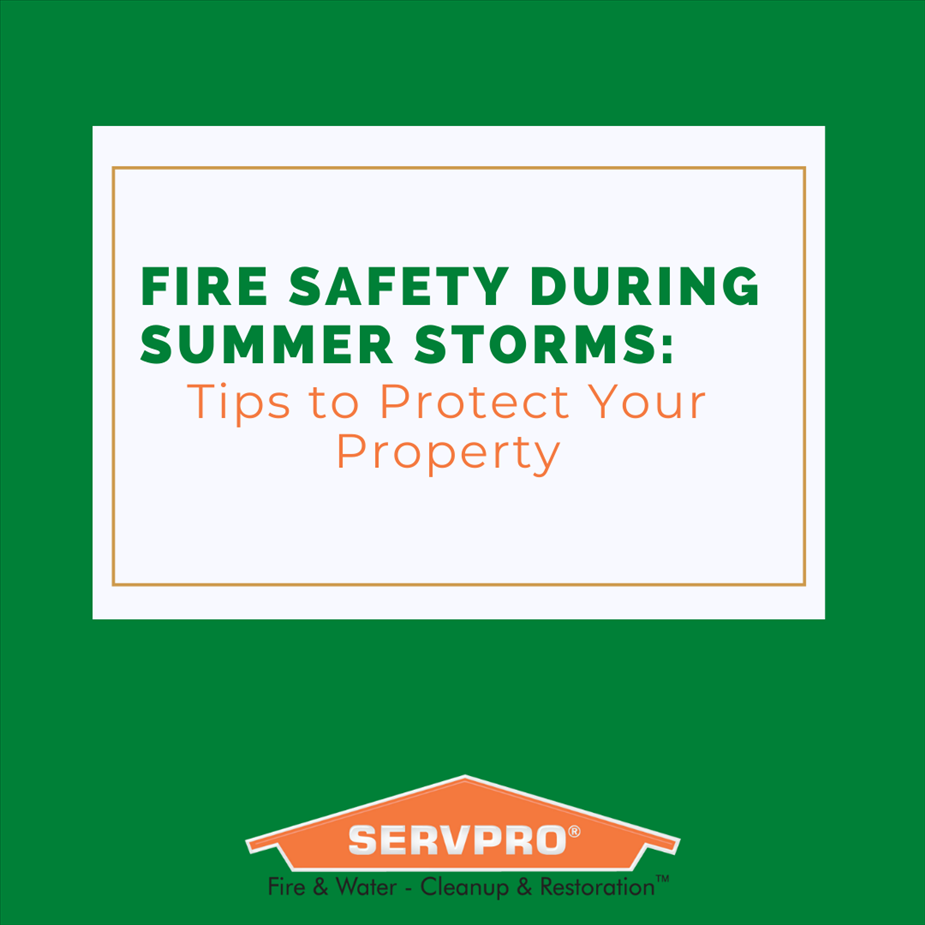 Here are some essential tips to protect your property from fire hazards during summer storms in Needham, MA
Here are some essential tips to protect your property from fire hazards during summer storms in Needham, MA
Summer storms bring unique fire hazards that can pose significant risks to your property. Lightning strikes, downed power lines, and other storm-related issues can ignite fires, making it crucial to take proactive measures to safeguard your home. Here are some essential tips to protect your property from fire hazards during summer storms in Needham, MA
Understand Fire Hazards Related to Summer Storms
Lightning Strikes: Lightning is a common cause of fires during summer storms. It can strike trees, power lines, and buildings, sparking fires that spread quickly.
Downed Power Lines: Strong winds and heavy rain can cause power lines to fall, creating sparks that can ignite nearby vegetation or structures.
Power Surges: Electrical storms can cause power surges, potentially leading to fires if your home’s electrical system is not adequately protected.
Tips to Protect Your Property
Use Surge Protectors: Protecting your home’s electrical system from power surges is crucial during summer storms. Here’s how:
- Install Whole-House Surge Protectors: A whole-house surge protector can safeguard your home’s electrical system by diverting excess voltage away from your appliances and wiring.
- Use Point-of-Use Surge Protectors: Plug sensitive electronics, such as computers, televisions, and kitchen appliances, into surge protector power strips.
- Unplug Electronics During Storms: If a severe storm is forecasted, unplug non-essential electronics to prevent damage from potential power surges.
Keep Dry Vegetation Trimmed: Dry vegetation around your home can easily ignite and fuel a fire. Maintaining your landscape is a crucial step in fire prevention:
- Trim Trees and Shrubs: Regularly trim trees and shrubs, especially those near your home and power lines, to prevent them from catching fire if struck by lightning.
- Remove Dead Plants: Clear away dead plants, leaves, and other debris that can act as kindling.
- Maintain a Defensible Space: Create a defensible space around your home by keeping at least a 30-foot radius clear of flammable vegetation and materials.
Maintain Clear Evacuation Routes: In the event of a fire, having clear and accessible evacuation routes is vital for the safety of your family:
- Plan and Practice: Develop an evacuation plan and practice it regularly with all household members. Ensure everyone knows at least two ways to exit each room.
- Keep Exits Clear: Ensure that windows, doors, and pathways are free from obstructions and can be easily accessed in an emergency.
- Emergency Supplies: Prepare an emergency kit with essentials such as water, non-perishable food, medications, and important documents. Keep it in a location that’s easy to grab quickly.
Additional Fire Safety Tips
- Install Smoke Alarms: Ensure smoke alarms are installed on every level of your home and outside sleeping areas. Test them monthly and replace batteries at least once a year.
- Use Fire-Resistant Building Materials: If you’re building or renovating, consider using fire-resistant materials for your roof, siding, and deck to reduce the risk of ignition.
- Stay Informed: Keep an eye on weather forecasts and be aware of any fire weather warnings in your area. Sign up for local emergency alerts to stay informed about potential fire risks.
By understanding the fire hazards associated with summer storms and taking these preventative measures, you can significantly reduce the risk of fire damage to your property. Stay vigilant and proactive to ensure your home and family remain safe during stormy weather.
SERVPRO of Newton / Wellesley is your comprehensive solution for residential and commercial restoration and cleaning services. Our highly trained technicians are available 24/7 to address any water, fire, or storm damage in Newton, Wellesley, Needham, Waban, MA, and surrounding areas.
Sparkling Celebrations: A Guide to Fireworks Safety
7/4/2024 (Permalink)
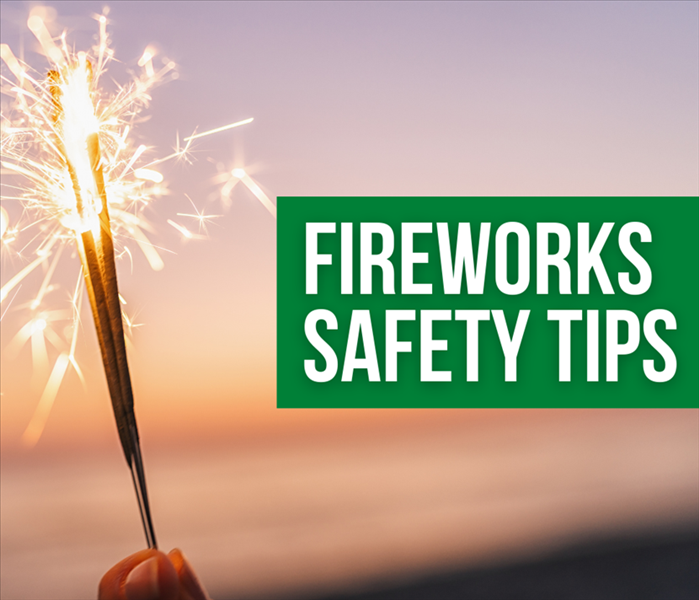 By following these safety guidelines, you can enjoy a dazzling fireworks display while ensuring the well-being of yourself and those around you.
By following these safety guidelines, you can enjoy a dazzling fireworks display while ensuring the well-being of yourself and those around you.
Fireworks add a touch of magic to any celebration, but they come with inherent risks. To ensure your festivities are both enjoyable and safe, it's crucial to follow proper fireworks safety guidelines. Here are some essential tips to keep in mind in Newton Upper Falls, MA:
Buy from Reliable Sources
Purchase fireworks only from licensed and reputable sellers. Avoid homemade or illegal fireworks, as they can be extremely dangerous.
Read the Instructions
Before igniting any fireworks, carefully read and understand the instructions. Pay attention to the recommended safety distances and methods of use.
Designate a Shooter
Assign a responsible adult to handle the fireworks. This person should not consume alcohol or any impairing substances during the event.
Keep a Safe Distance
Maintain a safe distance between the fireworks and the audience. Follow the recommended safety distances provided on the fireworks packaging.
Protective Gear
Wear safety glasses and ear protection when handling fireworks. Cotton clothing is preferable to synthetic materials, which can melt if a spark lands on them.
Lighting Instructions
Use a flashlight to read the labels and fuses in the dark. Light the fireworks at arm's length, and then quickly move away to a safe distance.
Keep Water Handy
Have a bucket of water or a hose nearby to extinguish any fires or mishaps. Soak used fireworks in water before disposing of them.
No Relighting
If a firework fails to ignite, do not attempt to relight it. Wait at least 20 minutes, then soak it in water before disposal.
Pet Safety
Keep pets indoors during fireworks displays. The loud noises can frighten them, leading to unpredictable behavior.
Follow Local Laws
Familiarize yourself with local laws and regulations regarding fireworks. Respect any bans or restrictions in your area.
Stay Sober
Never handle fireworks if you have consumed alcohol or drugs. Your judgment and coordination may be impaired, increasing the risk of accidents.
Dispose Properly
After the show, clean up the area. Dispose of fireworks debris in a metal container, as they can still be hot and pose a fire risk.
By following these safety guidelines, you can enjoy a dazzling fireworks display while ensuring the well-being of yourself and those around you. Remember, safety should always be the top priority when handling fireworks.
Choose the #1 Experts in Cleanup and Restoration for Residential and Commercial Fire, Mold, Water, and Storm Damage. Contact us today! We can assist with your damage and restoration needs in Newton Upper Falls, MA.
Keep Your Grill Sessions Safe and Fun This Season!
6/20/2024 (Permalink)
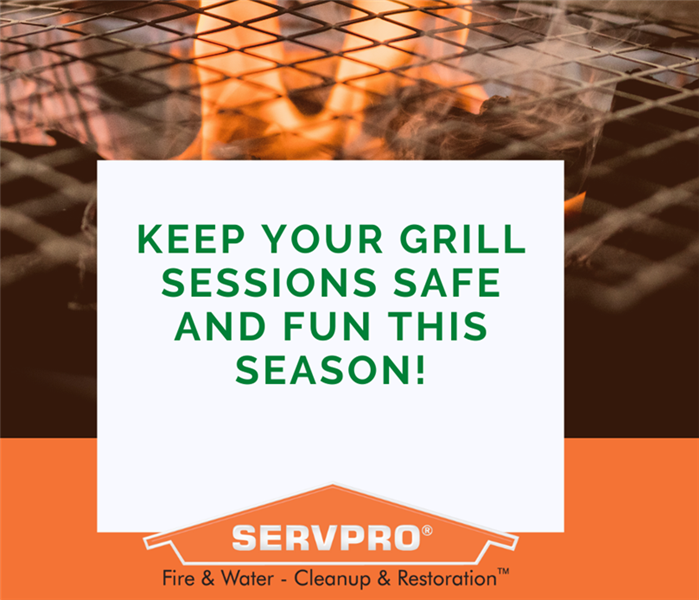 Stay safe, have fun, and enjoy those summer cookouts!
Stay safe, have fun, and enjoy those summer cookouts!
As the weather warms up, it's the perfect time to fire up the grill and enjoy some delicious outdoor cooking with family and friends. However, ensuring safety while grilling is crucial to prevent any fire hazards. Follow these simple tips to keep your grilling sessions safe and fun this season!
- Position Your Grill Safely
- Distance Matters: Place your grill at least 10 feet away from your house, deck railings, and overhanging branches.
- Stable Surface: Ensure your grill is on a stable, non-flammable surface to avoid tipping over.
- Maintain Your Grill
- Clean Regularly: Grease buildup can cause flare-ups. Clean your grill grates and drip trays before and after each use.
- Check for Leaks: Inspect gas grills for leaks by applying a light soap and water solution to the hose. If bubbles appear, there's a leak.
- Safe Lighting Practices
- Open Lid First: Always open the lid before lighting your gas grill to prevent gas buildup.
- Use Long Matches or Lighters: For charcoal grills, use long matches or lighters to ignite safely.
- Supervise and Protect
- Never Leave Unattended: Stay close by when grilling to monitor and manage any potential hazards.
- Keep Kids and Pets Away: Maintain a safe zone of at least 3 feet around the grill.
- Be Prepared for Emergencies
- Fire Extinguisher: Keep a fire extinguisher nearby and know how to use it.
- Baking Soda and Sand: Have baking soda for grease fires and sand or a bucket of water for charcoal fires.
Remember These Important No-No’s:
- No Flammable Liquids: Never use gasoline or other flammable liquids to start your grill.
- No Grilling Indoors: Grilling indoors or in an enclosed area can lead to carbon monoxide poisoning.
Stay safe, have fun, and enjoy those summer cookouts! Choose the #1 Experts in Cleanup and Restoration for Residential and Commercial Fire, Mold, Water, and Storm Damage. Contact us today! We can assist with your damage and restoration needs in Needham Junction, MA.
Common Challenges Homeowners May Encounter After A Fire in Newton, MA
4/16/2024 (Permalink)
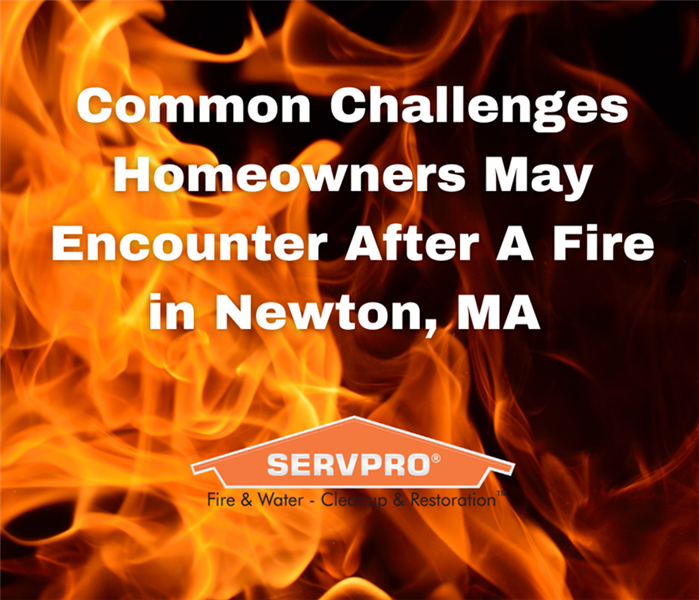 Despite the challenges, rebuilding after a fire is possible with patience, perseverance, and support.
Despite the challenges, rebuilding after a fire is possible with patience, perseverance, and support.
After a devastating house fire, the path to recovery can seem long and daunting.
Beyond the physical destruction, homeowners often face numerous obstacles when rebuilding their homes and lives. In this guide, we'll explore some common challenges homeowners encounter after a fire and provide tips to help navigate the process.
- Dealing with Insurance Companies. One of the first hurdles is dealing with insurance companies. Understanding your policy, thoroughly documenting the damage, and negotiating with adjusters can be overwhelming. Keep detailed records of all communication and damages, and don't hesitate to seek assistance from a public adjuster if needed.
- Finding Reputable Fire Restoration Contractors. Locating reliable contractors to repair fire damage can be challenging, especially in areas with high demand. Thoroughly research contractors, check references, and obtain multiple quotes. Working with a contractor specializing in fire damage restoration can streamline the process and ensure a high-quality rebuild.
- Coping with the Emotional Toll. The emotional impact of losing your home and possessions can be immense. Grief, anger, and frustration are normal reactions. Seeking support from friends, family, or a counselor can help cope with these emotions and navigate the rebuilding journey.
- Navigating Building Codes and Permits. Rebuilding often requires navigating complex building codes and obtaining permits. Work closely with a contractor familiar with local regulations to ensure your home is rebuilt to code and meets all safety standards.
- Managing Financial Strain. Rebuilding can be financially challenging, especially if not fully covered by insurance. Explore government assistance programs, crowdfunding options, or loans to help cover the costs.
Despite the challenges, rebuilding after a fire is possible with patience, perseverance, and support. By seeking assistance from professionals, staying organized, and prioritizing emotional well-being, you can successfully restore your home and move forward.
When disaster strikes, trust the experts at SERVPRO of Newton/Wellesley for comprehensive cleanup and restoration services. Their professionals respond quickly to any fire, mold, water, or storm-related damage, ensuring your property is restored to its preloss condition with meticulous attention to detail. Whether residential or commercial, SERVPRO of Newton/Wellesley delivers unmatched quality and reliability, making them the go-to solution for all cleanup and restoration needs.
Service Areas
Newton, MA | Wellesley, MA | Needham, MA | Waban, MA | Chestnut Hill, MA | Newton Upper Falls, MA | Newton Highlands, MA | Needham Junction, MA | Thompsonville, MA | Newton Lower Falls, MA
Smoke Signals: Professional Restoration for a Smoke-Free Environment in Newton Wellesley
2/20/2024 (Permalink)
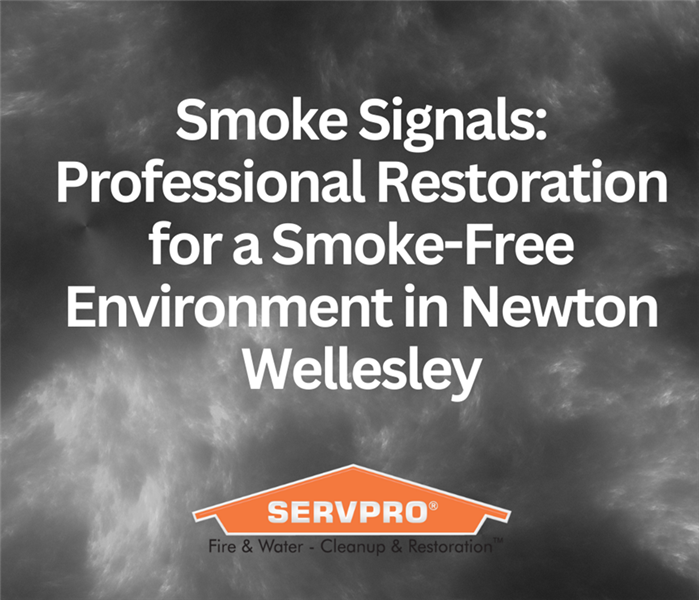 For individuals and businesses grappling with smoke damage aftermath, professional smoke restoration services serve as a beacon of hope.
For individuals and businesses grappling with smoke damage aftermath, professional smoke restoration services serve as a beacon of hope.
Smoke damage can infiltrate every nook and cranny of a property, leaving behind visible stains and persistent odors. Whether stemming from a fire, tobacco use, or other sources, the impact of smoke on indoor spaces can be profound. Discover the significance of professional smoke restoration services in purging environments of smoke residue and restoring indoor quality in Newton Wellesley.
Comprehending the Intricacies of Smoke Damage: Smoke damage transcends mere surface blemishes; it involves intricate interactions between diverse particles and surfaces. Seasoned smoke restoration services possess an in-depth understanding of smoke damage science, enabling them to tackle visible signs and concealed issues like odor infiltration and residue buildup.
Thorough Evaluation of Smoke Damage: Prior to commencing restoration endeavors, specialists conduct a meticulous assessment of smoke damage severity. This entails pinpointing affected surfaces, materials, and the specific nature of smoke residue present. This comprehensive appraisal serves as the groundwork for a focused and efficient restoration strategy.
Tailored Cleaning Approaches: Smoke restoration professionals employ specialized cleaning methodologies to eradicate smoke residues from surfaces. This may encompass dry, wet, or abrasive cleaning techniques tailored to the materials involved. The objective is to rejuvenate surfaces to their pre-damage state without causing further harm.
Strategies for Odor Neutralization: Lingering smoke odors can persist long after visible damage removal. Professional restoration services deploy advanced odor elimination strategies such as ozone treatments, thermal fogging, and specialized deodorizers. These methods neutralize and eradicate odors at a molecular level, ensuring a genuinely smoke-free ambiance.
HVAC System Purification: Smoke particles have a knack for infiltrating HVAC systems, disseminating odors and contaminants throughout a property. Smoke restoration experts extend their services to encompass comprehensive cleaning of ventilation systems, ductwork, and HVAC components. This guarantees that the entire indoor environment is free from smoke-related residues.
Preventing Cross-Contamination: Throughout the restoration process, specialists implement measures to avert cross-contamination to unaffected areas. This includes isolating damaged zones, employing containment barriers, and utilizing air filtration systems to capture and eliminate airborne smoke particles. These precautions are pivotal in forestalling residue spread to other sections of the property.
Enhancing Indoor Air Quality: A pivotal aspect of fostering a smoke-free environment is enhancing indoor air quality. Professional restoration services concentrate not only on visible damage remediation but also on enhancing air quality by eliminating airborne contaminants and ensuring proper ventilation.
Post-Restoration Assessment and Testing: To ensure the efficacy of restoration endeavors, professionals conduct post-restoration assessments and testing. This involves scrutinizing surfaces, conducting air quality examinations, and verifying the successful resolution of all smoke-related issues. The final step is furnishing clients with the assurance of a meticulously restored and smoke-free indoor environment.
For individuals and businesses grappling with smoke damage aftermath, professional smoke restoration services serve as a beacon of hope. By addressing smoke damage intricacies, employing tailored cleaning approaches, and executing comprehensive odor-elimination tactics, these experts play an indispensable role in fostering genuinely smoke-free indoor spaces. When smoke spells trouble, entrust in the proficiency of smoke restoration professionals to reinstate the clarity and purity of your indoor settings in Newton Wellesley.
SERVPRO Of Newton Wellesley stands as the premier choice in cleanup and restoration for residential and commercial buildings affected by fire, mold, water, and storm damage.
Flames Extinguished, Hopes Rekindled: Top-notch Fire Restoration Services in Newton Wellesley
2/15/2024 (Permalink)
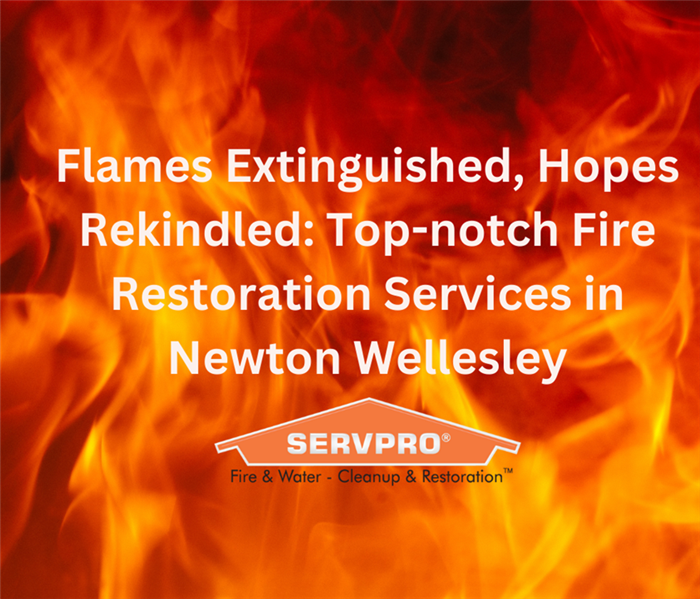 The proficiency, efficacy, and empathy of professional fire restoration experts play a pivotal role with fire damage.
The proficiency, efficacy, and empathy of professional fire restoration experts play a pivotal role with fire damage.
A fire's aftermath is often a harrowing experience, leaving destruction and despair in its wake. However, as the flames are quenched, the journey of rebuilding commences. In this pivotal moment, the significance of top-tier fire restoration services cannot be overstated. Delve into the indispensable role that professional fire restoration experts play in aiding individuals and businesses to rise from the ashes and reignite their hopes.
- Swift Response for Damage Control: Post-fire scenarios demand immediate intervention to curb further damage. Professional fire restoration services comprehend this urgency and act swiftly. Their prompt measures not only curb existing damage but also prevent secondary issues like water damage resulting from firefighting efforts.
- Comprehensive Assessment of Fire Damage: Fire damage encompasses various facets, impacting structures, possessions, and overall property safety. Seasoned fire restoration teams conduct meticulous assessments to gauge the damage's extent. This evaluation forms the basis for crafting a tailored restoration blueprint tailored to each case's unique requirements.
- Smoke and Soot Remediation: In addition to visible fire damage, smoke and soot residues can infiltrate every crevice of a property. Professional restoration services leverage specialized equipment and techniques to eradicate smoke and soot, ensuring a sanitized and safe environment for restoration endeavors.
- Structural Rebuilding and Repair: Fires can compromise a building's structural integrity. Proficient restoration experts are adept at handling structural repairs and reconstruction, ensuring that the property not only undergoes aesthetic restoration but also complies with safety standards.
- Belongings Restoration and Cleansing: Items affected by fire and smoke necessitate meticulous restoration. Fire restoration professionals employ advanced cleaning and restoration methods to salvage personal effects, furniture, and valuables. This endeavor significantly alleviates the emotional toll on individuals who have suffered losses.
- Effective Odor Neutralization: Lingering smoke and fire odors can linger long after the flames are extinguished. Fire restoration services utilize specialized deodorization techniques to effectively eliminate odors, providing a fresh and sanitary living or working environment.
- Streamlined Insurance Procedures: Maneuvering through insurance claims post-fire can be intricate. Fire restoration experts often lend a hand in coordinating with insurance providers, documenting damages, and providing precise assessments. This streamlined approach expedites the insurance claims process for swifter recovery.
- Emotional Support and Guidance: Post-fire recovery extends beyond physical restoration—it encompasses emotional healing. Professional fire restoration teams offer unwavering support and guidance, aiding individuals and families in navigating the hurdles of rebuilding and reigniting their hopes for the future.
While the aftermath of a fire may seem daunting, with premier fire restoration services, flames can be subdued, and hopes can be rekindled. The proficiency, efficacy, and empathy of professional fire restoration experts play a pivotal role in assisting individuals and businesses to rise anew from the ashes and reconstruct their lives. When confronted with the aftermath of a fire, place trust in the capabilities of fire restoration professionals to illuminate the path to a rejuvenated and restored future in Newton Wellesley.
SERVPRO Of Newton Wellesley remains the premier choice in Cleanup and Restoration for residential and commercial buildings affected by fire, mold, water, and storm damage.
Electrical Fire Safety: Protecting Your Home and Business in Newton Wellesley MA.
1/15/2024 (Permalink)
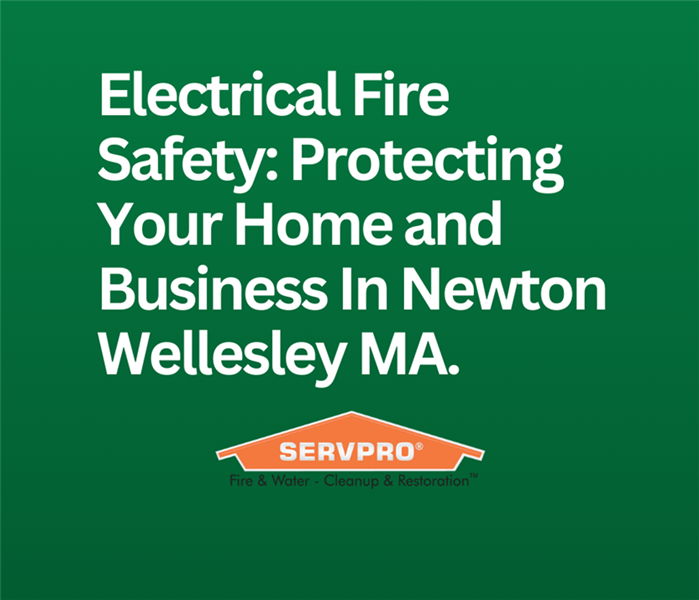 Stay informed, stay safe, and empower others with the knowledge needed to prevent electrical fires in Newton Wellesley MA.
Stay informed, stay safe, and empower others with the knowledge needed to prevent electrical fires in Newton Wellesley MA.
Electricity plays a crucial role in our daily lives, powering both our homes and businesses.
Despite its essential nature, electricity poses inherent risks, with electrical fires representing a significant threat to life and property. Understanding electrical fire safety is vital to minimize these risks and ensure the safety of occupants. Let's delve into key measures to enhance electrical fire safety in both residential and workplace settings.
Common Causes of Electrical Fires:
- Faulty Wiring: Aging or improperly installed wiring can lead to electrical fires. Regular inspections and maintenance are crucial to identify and rectify potential issues.
- Overloaded Circuits: Plugging numerous devices into a single outlet or overloading circuits can generate excessive heat, leading to sparks and fires. Distribute electrical loads evenly and avoid daisy-chaining multiple power strips.
- Malfunctioning Appliances: Appliances with damaged cords or internal components can become fire hazards. Regularly inspect and replace damaged cords, adhering to manufacturer guidelines for maintenance.
- Electrical Equipment Issues: Faulty electrical equipment, such as circuit breakers or outlets, can contribute to electrical fires. Ensure that all electrical components are in good working condition and promptly address any malfunctions.
- Flammable Materials Near Outlets: Placing flammable materials, such as curtains or paper, near electrical outlets or equipment increases the risk of fire. Keep these areas clear to minimize potential hazards.
Electrical Fire Safety Tips for Homes and Businesses:
- Regular Inspections and Maintenance: Schedule regular inspections of your electrical system, especially in older homes or buildings. Look for signs of wear and tear, exposed wires, or scorch marks. Hire a qualified electrician to address any issues promptly.
- Avoid Overloading Circuits: Be mindful of the number of devices plugged into outlets, and avoid overloading circuits. Use power strips with built-in surge protection to safeguard against voltage spikes.
- Proper Use of Extension Cords: Use extension cords only temporarily and avoid using them as permanent solutions. Never daisy-chain multiple extension cords together.
- Upgrade Wiring and Electrical Panels: Consider upgrading outdated wiring or electrical panels to meet current safety standards, significantly reducing the risk of electrical fires.
- Appliance Safety: Regularly check appliances for signs of damage, replace frayed or worn-out cords, and follow manufacturer guidelines for maintenance. Avoid leaving appliances unattended when in use.
- Install Smoke Alarms: Ensure that smoke alarms are installed in key areas of your home or business. Regularly test and replace batteries to guarantee their functionality.
- Emergency Response Plan: Develop and communicate an emergency response plan that includes procedures for dealing with electrical fires. Ensure that all occupants are aware of evacuation routes and the location of fire extinguishers.
Electrical fire safety is a shared responsibility that demands diligence and proactive measures. By staying vigilant, conducting regular inspections, and implementing safety measures, you can significantly reduce the risk of electrical fires at home and in the workplace.
Prioritizing electrical safety protects both property and, more importantly, ensures the safety and well-being of the people in your care. Stay informed, stay safe, and empower others with the knowledge needed to prevent electrical fires in Newton Wellesley MA.
Does Your Business Have a Fire Evacuation Plan In Newton Wellesley?
1/6/2024 (Permalink)
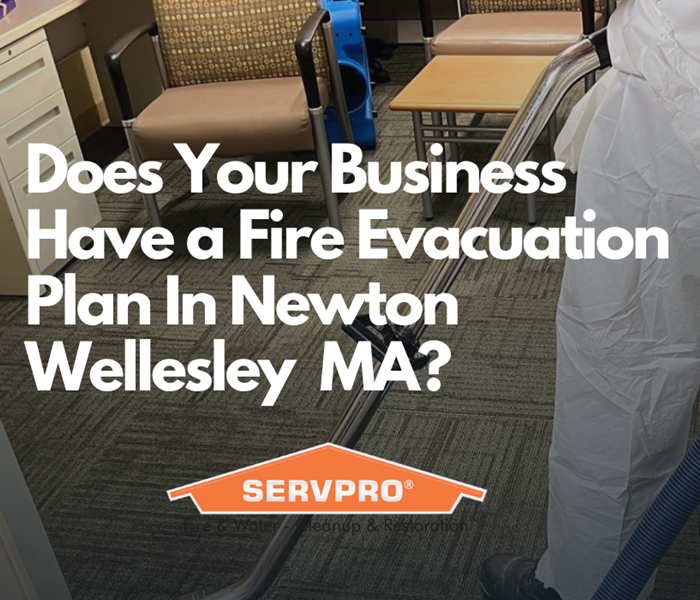 Regularly review and update your fire evacuation plan, ensuring everyone in your organization is prepared to respond decisively in a fire emergency.
Regularly review and update your fire evacuation plan, ensuring everyone in your organization is prepared to respond decisively in a fire emergency.
One crucial element often relegated to the background is a thorough fire evacuation plan. While we hope disasters never occur, preparedness for the worst can significantly impact the safety of your employees, clients, and assets.
Discover the importance of having a fire evacuation plan for your business and the measures you can adopt to ensure everyone's well-being.
Why a Fire Evacuation Plan Matters:
- Safeguarding Lives and Assets: The primary goal of a fire evacuation plan is to facilitate swift and safe building evacuation in the event of a fire. Lives are irreplaceable, and a well-crafted plan can minimize the risk of injuries or fatalities, protecting both individuals and valuable assets crucial for business continuity.
- Legal Compliance: Many jurisdictions mandate businesses to have a fire evacuation plan. Compliance with local fire safety regulations is not just a legal requirement but also a moral obligation to prioritize the well-being of your workforce and visitors. Failure to comply may result in severe consequences, such as fines and legal actions.
- Ensuring Business Continuity: While immediate safety is paramount during a fire, a robust evacuation plan also aids in maintaining business continuity. A prepared plan facilitates the swift resumption of essential operations after an incident, minimizing disruptions and potential financial losses.
Steps to Formulate an Effective Fire Evacuation Plan:
- Risk Assessment: Identify potential fire hazards within your premises, such as electrical equipment or flammable materials. Understanding these risks is the initial step in developing a targeted evacuation plan.
- Establish Clear Evacuation Routes: Designate primary and alternative evacuation routes that are well-lit, unobstructed, and easily accessible. Consider the needs of individuals with disabilities and make provisions to assist them during evacuations.
- Implement Emergency Communication: Set up a robust communication system to promptly alert occupants of a fire. This may involve fire alarms, intercoms, or other notification methods. Regularly test and maintain these systems for optimal functionality.
- Assign Responsibilities: Clearly define the roles and responsibilities of designated personnel during a fire evacuation. This includes individuals responsible for sounding alarms, guiding occupants to safety, and ensuring a headcount at assembly points.
- Conduct Drills and Training: Regularly practice fire evacuation drills to familiarize employees with procedures and exit routes. Provide training on fire safety, including the proper use of firefighting equipment, empowering individuals to respond effectively in an emergency.
A fire evacuation plan is more than a document on a shelf; it's a dynamic strategy that can make a significant difference in a crisis. Prioritize the safety of your employees and visitors by executing a well-thought-out plan, meeting legal obligations, and reflecting a commitment to their well-being.
Regularly review and update your fire evacuation plan, ensuring everyone in your organization is prepared to respond decisively in a fire emergency. In Newton Wellesley MA, safety should always be at the forefront of your business priorities.
Understanding the Different Types of Fire and Smoke Damage In Newton Wellesley MA.
1/6/2024 (Permalink)
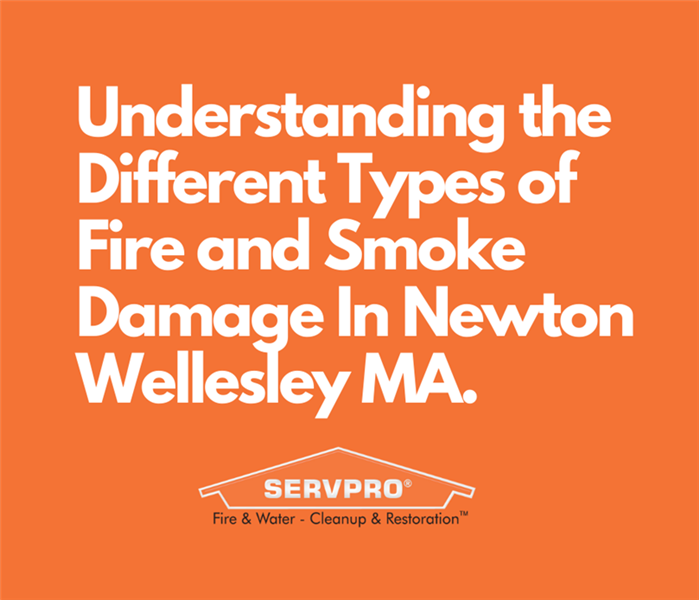 Understanding the nuances of different types of fire and smoke damage is a key step in the restoration process in Newton Wellesley MA.
Understanding the nuances of different types of fire and smoke damage is a key step in the restoration process in Newton Wellesley MA.
Facing a fire is a devastating experience, and its aftermath involves not only the visible destruction caused by flames but also the pervasive impact of smoke.
Fire and smoke damage can manifest in various ways, and comprehending the different types is essential for a successful restoration and recovery process. Here, we will explore the distinct types of fire and smoke damage along with the challenges associated with each.
Structural Damage:
- Description: Structural damage is the most visible consequence of a fire, impacting walls, floors, ceilings, and other building components.
- Causes: Direct exposure to flames, high temperatures, and compromised structural integrity during a fire.
- Challenges: Assessing and repairing structural damage often requires collaboration between structural engineers, contractors, and restoration specialists.
Soot Damage:
- Description: Soot is a fine, black residue composed of carbon particles resulting from incomplete combustion. It can cover surfaces and belongings, leaving behind a distinct odor and staining.
- Causes: Incomplete combustion of organic materials during a fire, releasing fine particles that settle on surfaces.
- Challenges: Cleaning soot demands specialized techniques and equipment to prevent smearing and further damage.
Smoke Damage:
- Description: Smoke damage encompasses the impact of smoke on surfaces, belongings, and indoor air quality, manifesting as discoloration, odors, and corrosive residues.Causes: The complex mixture of gases, chemicals, and particles released during a fire that adhere to surfaces and materials.
- Challenges: Proper ventilation, air purification, and targeted cleaning are essential to comprehensively address smoke damage.
Water Damage:
- Description: Water damage is a secondary consequence of firefighting efforts, resulting from the use of water to extinguish flames. It can lead to issues such as mold growth and structural deterioration.
- Causes: Firefighters' efforts to extinguish the fire using water or other suppressants.
- Challenges: Swift water extraction, drying, and dehumidification are critical to prevent further damage and mitigate the risk of mold growth.
Corrosion Damage:
- Description: Corrosion occurs when acidic byproducts of combustion react with metals, leading to deterioration and discoloration.
- Causes: Interaction between acidic residues in smoke and metal surfaces.
- Challenges: Prompt cleaning and treatment of metal surfaces are necessary to prevent irreversible corrosion damage.
Odor Damage:
- Description: Lingering odors are a common issue after a fire, caused by the combustion of various materials.
- Causes: Absorption of smoke particles into porous surfaces, making odors challenging to eliminate.
- Challenges: Odor removal requires specialized techniques, such as ozone treatment or thermal fogging, to neutralize and eliminate persistent smells.
Dealing with the aftermath of a fire involves addressing various types of damage, each requiring specific expertise and techniques. Restoration professionals play a crucial role in assessing and mitigating these damages, aiding individuals and businesses in rebuilding and recovering from the devastating effects of fire and smoke.
Understanding the nuances of different types of fire and smoke damage is a key step in the restoration process, ensuring a comprehensive and effective approach to recovery in Newton Wellesley MA.
What to Do in the Event of a Fire in Newton Wellesley
12/5/2023 (Permalink)
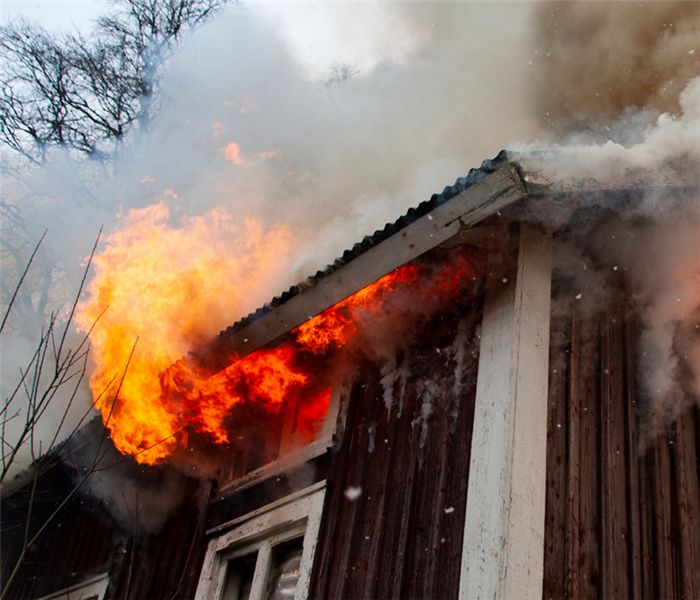 Preparation for a fire emergency involves education, awareness, and practice.
Preparation for a fire emergency involves education, awareness, and practice.
Fires can be unpredictable and escalate rapidly, posing a serious threat to life and property. Whether you're at home, work, or in public spaces, knowing how to respond to a fire emergency is crucial. Read on for practical guidance on handling a fire emergency in Newton Wellesley.
Maintain Composure and Stay Aware:
In any emergency situation, the first and most crucial step is to stay calm. Panic can impede clear thinking and quick decision-making. If you discover a fire or hear a fire alarm, stay calm and alert those around you. Time is of the essence in fire emergencies, and a composed mindset can facilitate prompt and effective action.
Evacuate Promptly:
Prioritize your safety and the safety of others. If the fire is small and manageable, use a suitable fire extinguisher. However, if the fire is spreading or you feel unsafe, leave the area immediately. Avoid wasting time gathering belongings; focus on evacuating quickly.
Follow Designated Exit Routes:
In public places or buildings, familiarize yourself with exit routes and emergency exits. During a fire, calmly follow these routes and assist others, especially those with mobility issues or disabilities. Refrain from using elevators during a fire; opt for stairwells.
Crawl Low in Smoky Conditions:
Smoke inhalation poses a significant risk during a fire. Stay close to the ground where the air is clearer. Crawling low can reduce the risk of inhaling harmful gases and increase the likelihood of reaching safety.
Call for Emergency Assistance:
Once safely outside the building, promptly call emergency services. Provide accurate information about the fire's location and nature. Avoid re-entering the building unless directed by emergency personnel.
Gather at a Designated Meeting Point:
In residential complexes or workplaces, establish a designated meeting point at a safe distance from the building. This ensures a quick and accurate account of everyone and aids emergency responders in assessing the situation.
Avoid Re-entering the Building:
Under no circumstances should you re-enter a burning building. Allow trained firefighters to handle the situation. Re-entering is extremely hazardous and can result in severe injuries or loss of life.
Adhere to Fire Prevention Measures:
Preventing fires is as crucial as knowing how to respond to them. Regularly check smoke detectors, electrical systems, and heating appliances. Avoid overloading electrical outlets and practice safe cooking habits. Proactive fire prevention significantly reduces the risk of a fire breaking out.
Preparation for a fire emergency involves education, awareness, and practice. By remaining calm, evacuating promptly, and following safety procedures, you can safeguard yourself and others. Regularly reviewing and practicing these steps ensures effective response readiness in the event of a fire, contributing to overall community safety.
SERVPRO Of Newton Wellesley is The #1 Choice in Cleanup and Restoration for residential and commercial buildings’ fire damage.
A Guide to Thanksgiving Fire Safety in Newton Wellesley, MA
11/1/2023 (Permalink)
 Explore the following Thanksgiving fire safety guidelines in Newton Wellesley, MA
Explore the following Thanksgiving fire safety guidelines in Newton Wellesley, MA
Experience the enticing fragrance of freshly roasted turkey, the comforting warmth emanating from pumpkin pie, and the joyous gathering of cherished ones, all contributing to a festive ambiance. Yet, in the midst of this celebration, it is imperative to prioritize safety, particularly concerning potential fire hazards.
Explore the following Thanksgiving fire safety guidelines to ensure that your holiday remains a time of gratitude and merriment.
Kitchen Safety: The epicenter of Thanksgiving is undeniably the kitchen, where the enchantment of the feast unfolds.
- Never leave the stove unattended, especially when using oils or frying.
- Keep flammable items, such as kitchen towels and oven mitts, at a safe distance from the stovetop.
- Confirm the proper functioning of smoke alarms, and have a fire extinguisher easily accessible.
Turkey Fryer Safety: Deep-frying turkeys has evolved into a popular Thanksgiving tradition, albeit with inherent risks.
- Set up the fryer outdoors, far from the house, deck, or any flammable materials.
- Ensure the turkey is fully thawed before frying to prevent oil splatters.
- Vigilantly monitor the oil temperature and avoid overfilling the fryer.
Candle Caution: While candles contribute to a warm and inviting atmosphere during Thanksgiving dinner, they also pose a fire risk.
- Keep candles away from flammable decorations and other items.
- Place candles in stable, non-tip holders.
- Never leave lit candles unattended; extinguish them before leaving the room.
Electrical Safety: Thanksgiving often involves a plethora of electrical appliances and devices.
- Avoid overloading electrical outlets and use surge protectors when necessary.
- Inspect cords for frays or damage, replacing them if necessary.
- Turn off appliances when not in use, and ideally, unplug them.
Keep an Eye on Children: While children contribute to the joy of the season, they can be curious and oblivious to potential dangers.
- Designate a kid-free zone in the kitchen.
- Educate children about fire safety and stress the importance of staying away from hot surfaces.
- Assign a responsible adult to supervise young children during festivities.
Prioritizing safety is paramount, particularly concerning potential fire hazards. SERVPRO Of Newton Wellesley is The #1 Choice in Cleanup and Restoration for residential and commercial buildings’ fire damage. Call us today at (617) 332-9000.
A Guide to Christmas Fire Safety in Newton Wellesley, MA.
11/1/2023 (Permalink)
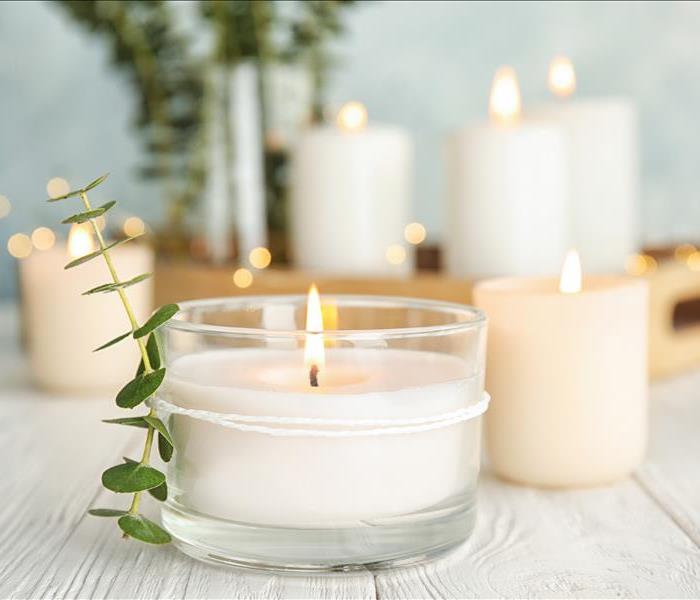 Here are some crucial tips to guarantee a Merry and secure Christmas for you and your loved ones.
Here are some crucial tips to guarantee a Merry and secure Christmas for you and your loved ones.
As the holiday season draws near, families come together, homes are adorned with sparkling lights and festive decorations, and the enticing aroma of delectable meals permeates the air. However, amid the joyous celebrations, it's paramount to prioritize safety, particularly concerning fire safety during the holidays.
Here are some crucial tips to guarantee a Merry and secure Christmas for you and your loved ones.
Thoughtful Decoration Placement:
Embracing the tradition of adorning the halls with festive decorations is a cherished part of Christmas. Yet, it's essential to be mindful of where and how you place them. Keep heat-sensitive materials like curtains, tablecloths, and other decorations away from sources of heat such as candles and fireplaces. Opt for flame-resistant or flame-retardant decorations when feasible.
Candle Safety:
While candles contribute to a warm and inviting atmosphere, they also pose a significant fire hazard. If you appreciate the glow of candlelight, consider using flameless LED candles as a safer alternative. If you opt for traditional candles, never leave them unattended, place them out of reach of children and pets, and ensure they are securely positioned in stable holders on a flat surface.
Inspect Christmas Lights:
Before adorning your space with Christmas lights, carefully inspect them for any signs of damage like frayed wires, broken bulbs, or exposed wiring. Dispose of and replace any compromised lights, and always adhere to the manufacturer's usage guidelines. Consider the use of LED lights, as they emit less heat and are more energy-efficient than traditional incandescent lights.
Thoughtful Tree Care:
For those with live Christmas trees, maintaining adequate hydration is crucial for fire prevention. Dry trees are highly flammable, so be diligent about regularly watering your tree and keeping it away from heat sources. If you choose an artificial tree, ensure it is labeled as flame-resistant.
Cooking Safety:
The Christmas feast is a central aspect of the celebration, but it's also a time when kitchen fires are more prevalent. Stay vigilant while cooking, utilize timers to prevent overcooking, and keep heat-sensitive items like kitchen towels and oven mitts away from the stove. If deep-frying, do so outdoors and at a safe distance from structures.
Have an Escape Plan:
In the unfortunate event of a fire, having a well-thought-out escape plan is crucial. Ensure that everyone in the household is familiar with the plan, including designated meeting points outside the home. Regularly practice fire drills, especially if you have guests staying with you during the holidays.
Christmas is a season of joy, warmth, and togetherness. By taking simple precautions and being mindful of fire safety, you can ensure that the holiday season remains merry and bright for everyone. SERVPRO Of Newton Wellesley is The #1 Choice in Cleanup and Restoration for residential and commercial buildings’ fire damage. Call us today at (617) 332-9000.
A Guide to Christmas Fire Safety in Newton Wellesley, MA.
11/1/2023 (Permalink)
 Here are some crucial tips to guarantee a Merry and secure Christmas for you and your loved ones.
Here are some crucial tips to guarantee a Merry and secure Christmas for you and your loved ones.
As the holiday season draws near, families come together, homes are adorned with sparkling lights and festive decorations, and the enticing aroma of delectable meals permeates the air. However, amid the joyous celebrations, it's paramount to prioritize safety, particularly concerning fire safety during the holidays.
Here are some crucial tips to guarantee a Merry and secure Christmas for you and your loved ones.
Thoughtful Decoration Placement:
Embracing the tradition of adorning the halls with festive decorations is a cherished part of Christmas. Yet, it's essential to be mindful of where and how you place them. Keep heat-sensitive materials like curtains, tablecloths, and other decorations away from sources of heat such as candles and fireplaces. Opt for flame-resistant or flame-retardant decorations when feasible.
Candle Safety:
While candles contribute to a warm and inviting atmosphere, they also pose a significant fire hazard. If you appreciate the glow of candlelight, consider using flameless LED candles as a safer alternative. If you opt for traditional candles, never leave them unattended, place them out of reach of children and pets, and ensure they are securely positioned in stable holders on a flat surface.
Inspect Christmas Lights:
Before adorning your space with Christmas lights, carefully inspect them for any signs of damage like frayed wires, broken bulbs, or exposed wiring. Dispose of and replace any compromised lights, and always adhere to the manufacturer's usage guidelines. Consider the use of LED lights, as they emit less heat and are more energy-efficient than traditional incandescent lights.
Thoughtful Tree Care:
For those with live Christmas trees, maintaining adequate hydration is crucial for fire prevention. Dry trees are highly flammable, so be diligent about regularly watering your tree and keeping it away from heat sources. If you choose an artificial tree, ensure it is labeled as flame-resistant.
Cooking Safety:
The Christmas feast is a central aspect of the celebration, but it's also a time when kitchen fires are more prevalent. Stay vigilant while cooking, utilize timers to prevent overcooking, and keep heat-sensitive items like kitchen towels and oven mitts away from the stove. If deep-frying, do so outdoors and at a safe distance from structures.
Have an Escape Plan:
In the unfortunate event of a fire, having a well-thought-out escape plan is crucial. Ensure that everyone in the household is familiar with the plan, including designated meeting points outside the home. Regularly practice fire drills, especially if you have guests staying with you during the holidays.
Christmas is a season of joy, warmth, and togetherness. By taking simple precautions and being mindful of fire safety, you can ensure that the holiday season remains merry and bright for everyone. SERVPRO Of Newton Wellesley is The #1 Choice in Cleanup and Restoration for residential and commercial buildings’ fire damage. Call us today at (617) 332-9000.
Protecting Your Home: A Comprehensive Guide to Fire Prevention
10/4/2023 (Permalink)
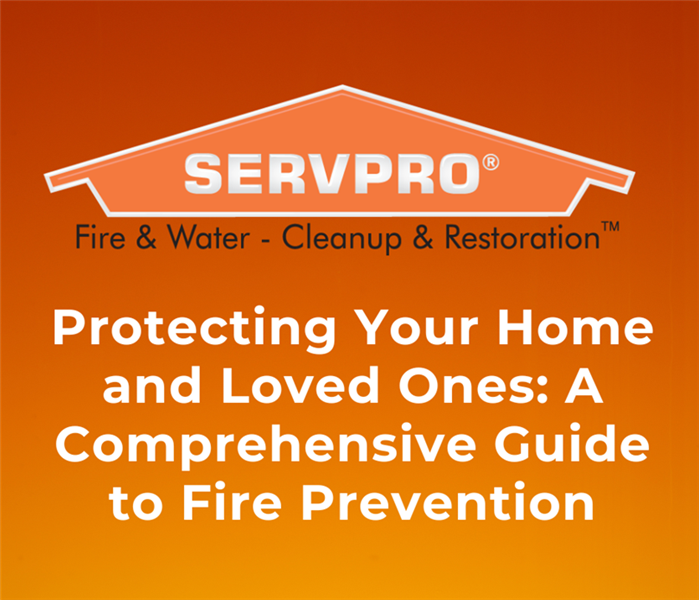 you can significantly reduce the risk of fires and protect your home and loved ones from this destructive force in Newton Wellesley.
you can significantly reduce the risk of fires and protect your home and loved ones from this destructive force in Newton Wellesley.
Fire is a powerful and destructive force that can devastate lives and property within seconds.
Many fires can be prevented with proper awareness, precautions, and responsible behavior. Here are essential tips and strategies for fire prevention.
- Install Smoke Alarms: These devices are your first line of defense against fires. Ensure you have smoke alarms installed in key areas like bedrooms, hallways, and the kitchen. Regularly test them to make sure they are working correctly and replace their batteries at least once a year.
- Create a Fire Escape Plan: Make sure everyone in your household knows the plan, including multiple escape routes, a designated meeting point outside, and how to call 911. Practice fire drills regularly to ensure everyone is familiar with the process.
- Fire-Resistant Building Materials: If you're building a new home or renovating, consider using fire-resistant materials like fire-resistant roofing, siding, and insulation. These materials can slow the spread of flames and increase the chances of containing a fire until help arrives.
- Properly Store Flammable Materials: Store flammable materials, such as gasoline, propane, and paints, in a well-ventilated area away from heat sources and open flames. Use appropriate containers and follow safety guidelines to prevent leaks or spills.
- Maintain Heating Equipment: Heating equipment, including fireplaces, wood stoves, and furnaces, should be regularly inspected and maintained by professionals. Keep flammable materials at a safe distance and use protective barriers like screens to prevent sparks from escaping.
- Safe Cooking Practices: Never leave the kitchen unattended while cooking, and keep flammable objects like dish towels and curtains away from the stove. Install a fire extinguisher in or near the kitchen and know how to use it.
- Electrical Safety: Faulty electrical systems or appliances can trigger fires. Inspect electrical cords and outlets for damage and replace them if necessary. Avoid overloading electrical outlets and use surge protectors when needed.
- Candle Safety: Keep candles away from flammable materials and never leave them unattended. Consider using flameless LED candles as a safer alternative.
- Smoking Safety: If you smoke, do so outside and use a sturdy, deep ashtray. Ensure cigarettes are completely extinguished before disposing of them. Never smoke in bed, as falling asleep with a lit cigarette can lead to a deadly fire.
- Teach Fire Safety to Children: Children should be educated about fire safety from a young age. Teach them about the dangers of fire, how to respond in case of a fire, and the importance of not playing with matches or lighters.
Preventing fires is a shared responsibility that requires diligence and awareness. By following these fire prevention tips and fostering a culture of safety in your household, you can significantly reduce the risk of fires and protect your home and loved ones from this destructive force in Newton Wellesley. Remember, when it comes to fire prevention, an ounce of prevention is worth a pound of cure. Stay safe, and prepared, and prevent fires to your home in Needham, MA.
SERVPRO® Of Newton Wellesley is The #1 Choice in Cleanup and Restoration for residential and commercial buildings’ fire, mold, water, and storm damage. Call us today at (617) 332-9000
How to Deal with Fire and Smoke Damage in a Home or Business in Newton Wellesley
6/7/2023 (Permalink)
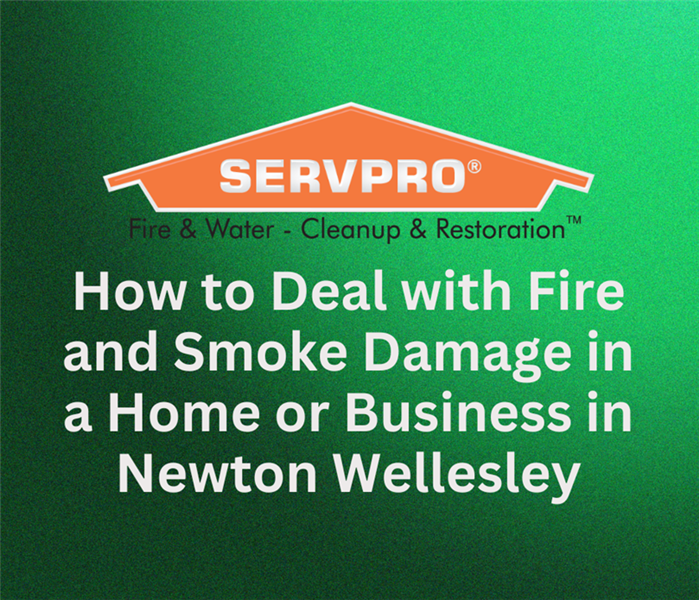 Experiencing a fire incident in your home or business can be a traumatic event.
Experiencing a fire incident in your home or business can be a traumatic event.
Experiencing a fire incident in your home or business can be a traumatic event. Aside from the immediate danger and destruction caused by flames, the aftermath of fire and smoke damage can present significant challenges. Here are steps to help you navigate the recovery process successfully.
- Ensure Safety: It is crucial to wait for approval from the fire department or relevant authorities that the building is structurally safe. Wear appropriate protective gear, including masks, gloves, and eye protection, as smoke residues can contain harmful particles.
- Contact Professionals: Once the property is deemed safe to enter, contact a reputable fire damage restoration company as soon as possible, such as SERVPRO Of Newton Wellesley. We have the expertise, experience, and specialized equipment to handle fire and smoke damage effectively. We will assess the extent of the damage, provide guidance, and develop a comprehensive restoration plan tailored to your specific situation.
- Document the Damage: Before any cleanup or repairs take place, document the damage thoroughly. Take photographs and make a detailed inventory of all affected items and structural damage. This documentation will be crucial for insurance claims and can help ensure that nothing is overlooked during the restoration process.
- Ventilate the Area: Open windows and doors to allow fresh air to circulate throughout the space. This helps to dissipate residual smoke and reduce odors. However, exercise caution if there is significant structural damage, as opening windows or doors could pose safety risks.
- Clean and Remove Soot: Soot and smoke residues can cause significant damage if left untreated. Begin by vacuuming loose soot particles using a high-efficiency particulate air (HEPA) vacuum cleaner. Avoid using regular household vacuums, as they may blow soot particles back into the air. Consider SERVPRO Of Newton Wellesley for thorough cleaning and restoration of delicate items such as textiles, electronics, and artwork.
- Assess and Repair Structural Damage: Evaluate the structural integrity of your property and address any immediate concerns. Seek assistance from a licensed contractor or structural engineer to determine the extent of the damage and develop a plan for repairs or rebuilding.
- Eliminate Odors: Smoke odor can be persistent and challenging to remove. Begin by airing out the space and using fans or dehumidifiers to promote air circulation. Deep clean carpets, upholstery, and curtains to eliminate embedded smoke particles.
Remember to remain patient and resilient throughout the recovery process, as restoring your property to its preloss condition may take time.
SERVPRO Of Newton Wellesley is The #1 Choice in Cleanup and Restoration for residential and commercial buildings’ fire, mold, water, and storm damage. We service Needham Junction, Needham, Newton Highlands, Newton Lower Falls, Newton Upper Falls, Thompsonville, Waban, and Wellesley, MA
Does My Home Need A Rebuild After A Fire?
5/18/2023 (Permalink)
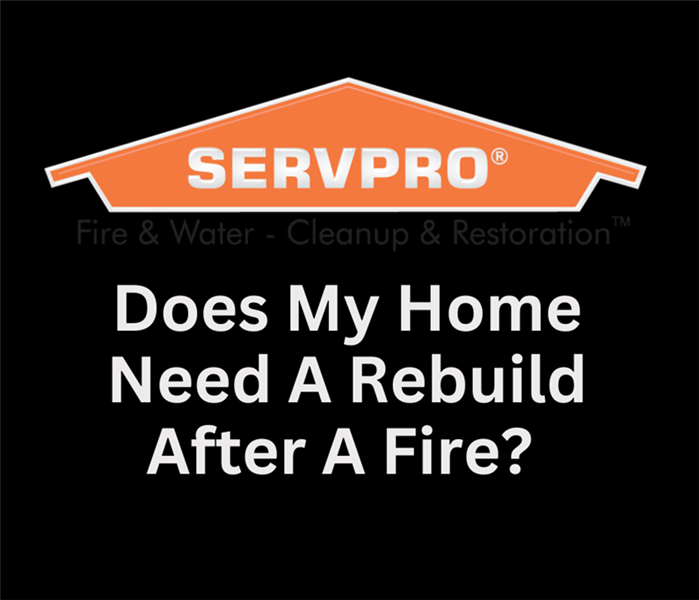 One of the most pressing questions is whether or not your home needs to be rebuilt after a fire.
One of the most pressing questions is whether or not your home needs to be rebuilt after a fire.
Experiencing a fire in your home is an overwhelming and devastating event. One of the most pressing questions is whether or not your home needs to be rebuilt after a fire.
- The first step in deciding whether or not your home needs to be rebuilt after a fire is to determine the extent of the damage. A thorough assessment should be conducted by a qualified professional to determine the damage to the structure, electrical and plumbing systems, and any other systems or appliances affected by the fire. In some cases, the damage may be limited to a particular area of the home, and repairs can be made without needing a full rebuild. However, if the damage is extensive, and the cost of repairs is significant, it may be more practical to rebuild the home from scratch.
- Once the extent of the damage has been determined, the next step is to assess the cost of repairs versus rebuilding. In some cases, the cost of repairs may be relatively minor and can be covered by insurance. However, if the damage is extensive, the cost of repairs may exceed the value of the home, making a rebuild a more practical solution.
- Navigating the process of rebuilding your home after a fire can be complex and challenging. Working with your insurance company and qualified contractors can help to ensure that the process goes smoothly and that your home is rebuilt to the highest standards.
- Experiencing a fire in your home is a traumatic experience, and the decision to rebuild can be a difficult one. However, by assessing the extent of the damage, weighing the cost of repairs versus rebuilding, and working with qualified professionals, you can make an informed decision and begin the process of rebuilding your home and your life.
SERVPRO Of Newton Wellesley is The #1 Choice in Cleanup and Restoration for residential and commercial buildings’ fire, mold, water, and storm damage.
We service Dedham, East Dedham, Endicott, Medfield, Norwood Centre, Norwood, Walpole, MA, and Westwood, MA
Can Cooking Grease Cause Fires?
5/9/2023 (Permalink)
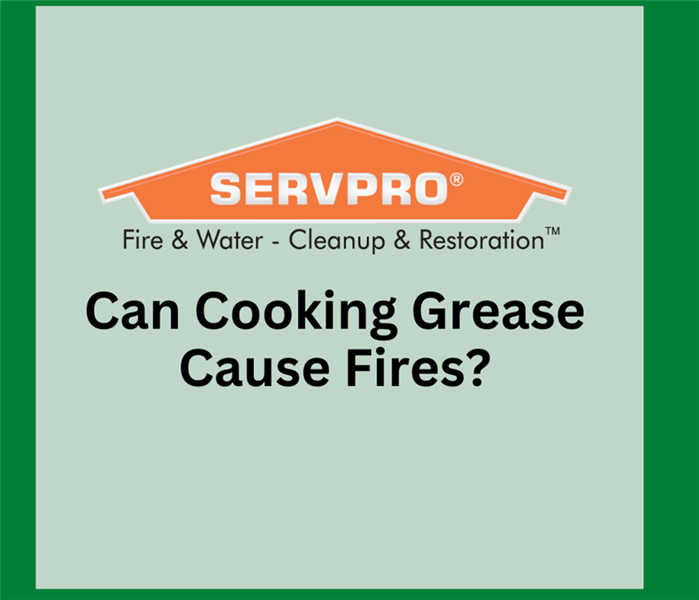 If the grease becomes too hot, it can ignite and start a fire.
If the grease becomes too hot, it can ignite and start a fire.
Cooking is a daily activity for many people, and while it can be a fun and satisfying experience, it can also be dangerous if proper safety measures are not taken. One common kitchen hazard is the risk of fires caused by cooking grease.
Cooking grease is the oil or fat that is left over after cooking, and it can be found in many different forms such as bacon grease, butter, vegetable oil, and more.
The reason why cooking grease is so dangerous is that it is highly flammable. If the grease becomes too hot, it can ignite and start a fire. This can happen if you leave a pan on the stove unattended or if you overheat the grease while cooking.
To prevent cooking grease fires, it is important to take a few simple precautions:
- Never leave hot grease unattended: When you are cooking with grease, it is important to stay in the kitchen and keep an eye on the pan at all times. If you need to step away, turn off the heat and remove the pan from the stove.
- Use a splatter guard: A splatter guard is a mesh screen that is placed over the top of a pan to prevent hot grease from splattering out. This can help reduce the risk of a fire.
- Keep a lid nearby: If a fire does break out, you should immediately cover the pan with a lid to smother the flames. This will help prevent the fire from spreading.
- Store grease properly: After cooking with grease, it is important to store it in a safe and secure container. This can be a metal can or a glass jar with a tight-fitting lid. Never pour grease down the drain, as this can clog pipes and cause other problems.
- Dispose of grease safely: When you are ready to dispose of the grease, wait for it to cool completely and then scrape it into a container that can be sealed. This can then be thrown away in the trash.
In addition to these precautions, it is also important to have a working fire extinguisher in the kitchen and to know how to use it. If a fire does break out, you should use the extinguisher to put out the flames. If the fire is too large or if you are not able to put it out, evacuate the building immediately and call 911.
SERVPRO Of Newton Wellesley is The #1 Choice in Cleanup and Restoration for residential and commercial buildings’ fire, mold, water, and storm damage.
We service Dedham, East Dedham, Endicott, Medfield, Norwood Centre, Norwood, Walpole, MA, and Westwood, MA
What Causes Microwave Fires?
5/4/2023 (Permalink)
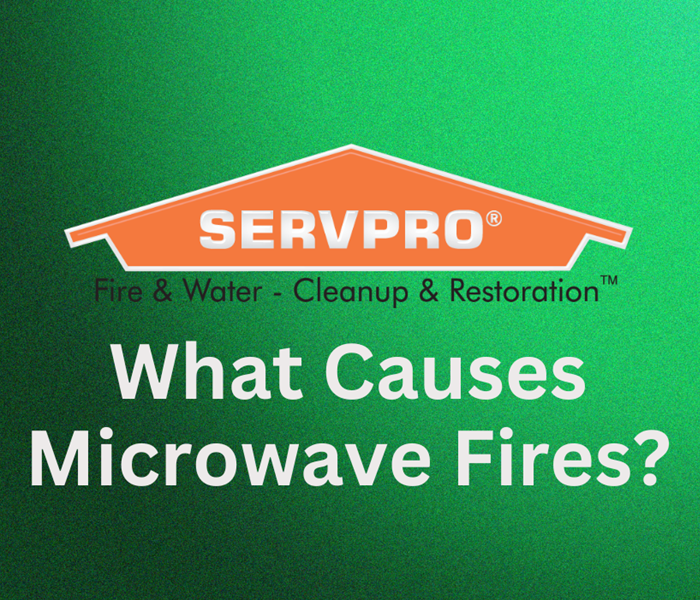 Microwave fires can be dangerous and should be avoided at all costs.
Microwave fires can be dangerous and should be avoided at all costs.
Microwaves have become an essential part of modern kitchens, allowing us to quickly heat up food and beverages. One of the most dangerous risks associated with microwaves is the possibility of a fire.
The leading cause of microwave fires is the use of inappropriate containers or dishes. Microwave-safe containers are designed to withstand the high heat generated by the microwave, while other containers may melt, warp, or even catch fire.
Common materials that are not suitable for microwaving include aluminum foil, metal, plastic containers that are not labeled as microwave-safe, and dishes with metallic or gold paint.
Another factor that can cause microwave fires is the buildup of grease or food residue inside the appliance. When food particles accumulate on the walls or ceiling of the microwave, they can overheat and catch fire.
It is essential to clean your microwave regularly, especially after cooking greasy or fatty foods. To clean your microwave, use a damp cloth or sponge to wipe the interior surfaces, and avoid using abrasive cleaning agents.
Furthermore, overheating food can also lead to microwave fires. When food is cooked for too long, or if the microwave's power settings are set too high, the food can overheat and ignite. It is vital to follow the cooking instructions carefully and to stop cooking the food once it has reached the recommended temperature.
Lastly, a faulty or malfunctioning microwave can also cause fires. If your microwave is making unusual noises, sparks, or emits smoke, it is essential to stop using it immediately and have it inspected by a professional.
Microwave fires can be dangerous and should be avoided at all costs. To prevent microwave fires, use only microwave-safe containers, keep your microwave clean, do not overheat food, and have any malfunctioning microwave inspected by a professional. By following these safety tips, you can enjoy the convenience of a microwave without putting yourself or your home at risk.
SERVPRO Of Newton Wellesley is The #1 Choice in Cleanup and Restoration for residential and commercial buildings’ fire, mold, water, and storm damage.
We service Dedham, East Dedham, Endicott, Medfield, Norwood Centre, Norwood, Walpole, MA, and Westwood, MA
Grill Fire Safety Tips
4/26/2023 (Permalink)
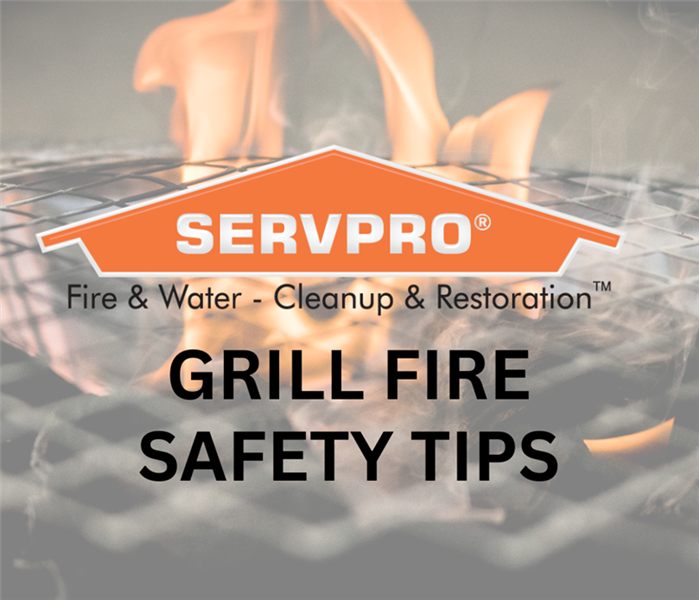 A grill fire can happen quickly and without warning, but there are steps you can take to prevent them from occurring.
A grill fire can happen quickly and without warning, but there are steps you can take to prevent them from occurring.
Grilling is a popular outdoor activity. Whether you're cooking burgers, chicken, or vegetables, it's important to prioritize safety when using a grill. A grill fire can happen quickly and without warning, but there are steps you can take to prevent them from occurring.
Let’s discuss grill fire safety tips:
- Choose the right location for your grill: When choosing where to place your grill, ensure that it is at least 10 feet away from your home or any other combustible structures. Keep it away from overhanging branches, deck railings, and other potentially flammable objects.
- Clean your grill regularly: Cleaning your grill regularly can prevent grease buildup and reduce the risk of flare-ups. Grease fires can happen when grease and fat accumulate on the grates and drip pans. Make sure to clean your grill after every use, and occasionally deep clean it with a grill brush.
- Check for gas leaks: If you have a gas grill, make sure to check the hoses and connections for leaks before every use. A gas leak can cause an explosion or fire, so it's important to be vigilant.
- Keep a fire extinguisher nearby: In case of a fire, make sure to have a fire extinguisher nearby. Ensure that you know how to use it before you need it.
- Be mindful of what you're cooking: Some foods, like fatty meats or foods marinated in oil, are more likely to cause flare-ups. Be mindful of what you're cooking and how you're cooking it. Keep a close eye on the grill, and use a spray bottle of water to douse any small flames.
- Never leave the grill unattended: Never leave the grill unattended, especially if you have children or pets in the area. Accidents can happen quickly, and it's important to be present to address any issues that may arise.
- Shut off the grill properly: After you're finished cooking, make sure to shut off the grill properly. Turn off the burners and close the gas valve if you have a gas grill. For a charcoal grill, spread the coals out and let them cool down completely before disposing of them in a metal container.
By following these tips and being mindful of your surroundings, you can ensure that your next cookout is a safe and enjoyable experience for everyone involved.
We service Needham Junction, Needham, Newton Highlands, Newton Lower Falls, Newton Upper Falls, Thompsonville, Waban, and Wellesley, MA
SERVPRO Of Newton Wellesley is The #1 Choice in Cleanup and Restoration for residential and commercial buildings’ fire, mold, water, and storm damage.
What should you do after a fire?
4/17/2023 (Permalink)
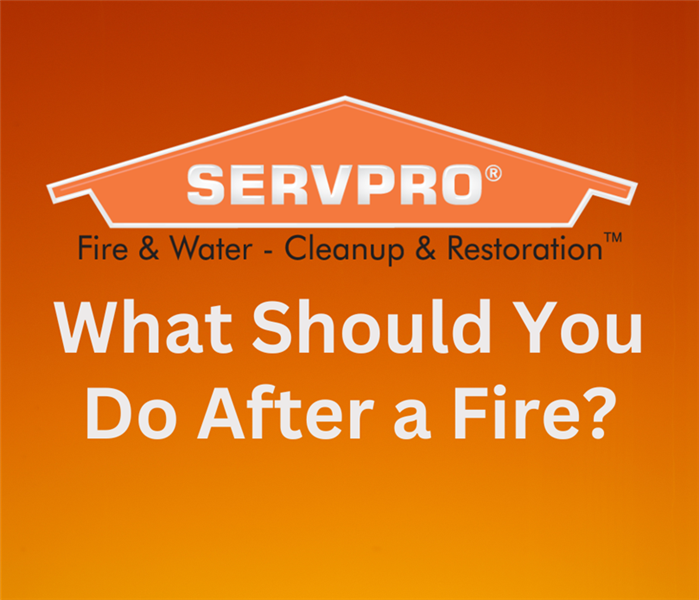 A fire can be a traumatic and devastating event. It's important to take immediate action
A fire can be a traumatic and devastating event. It's important to take immediate action
A fire can be a traumatic and devastating event. It's important to take immediate action to start the process of recovery and ensure the safety of your home and family.
Here are some steps you should take after a fire:
- Contact your insurance company: One of the first things you should do after a fire is to contact your insurance company. They can help you start the claims process and provide guidance on what steps to take next.
- Assess the damage: Once it is safe to do so, assess the damage to your home. Look for any visible damage, including structural damage, water damage, and smoke damage. Take photos of the damage to provide to your insurance company.
- Secure your property: If your home is severely damaged, you may need to board up windows and doors or cover damaged areas to prevent further damage from weather or vandalism.
- Contact restoration professionals: A professional restoration company can help you with the cleanup, salvage, and restoration of your home and belongings. They can also help you assess the extent of the damage and provide guidance on the best course of action.
- Salvage what you can: If it is safe to do so, try to salvage any belongings that were not damaged by the fire. You may be able to save some items with proper cleaning and restoration.
- Address smoke damage: Smoke can cause extensive damage to a home, even in areas not directly affected by the fire. Be sure to address smoke damage to prevent health hazards and further damage to your home.
- Ensure safety: Before returning to your home, ensure that it is safe to do so. Check for gas leaks, electrical hazards, and other safety concerns.
By contacting your insurance company, assessing the damage, securing your property, contacting restoration professionals, salvaging what you can, addressing smoke damage, and ensuring safety, you can begin to rebuild and move forward after a fire.
We service Needham Junction, Needham, Newton Highlands, Newton Lower Falls, Newton Upper Falls, Thompsonville, Waban, and Wellesley, MA
SERVPRO Of Newton Wellesley is The #1 Choice in Cleanup and Restoration for residential and commercial buildings’ fire, mold, water, and storm damage.
Why do you need a fire safety plan?
4/14/2023 (Permalink)
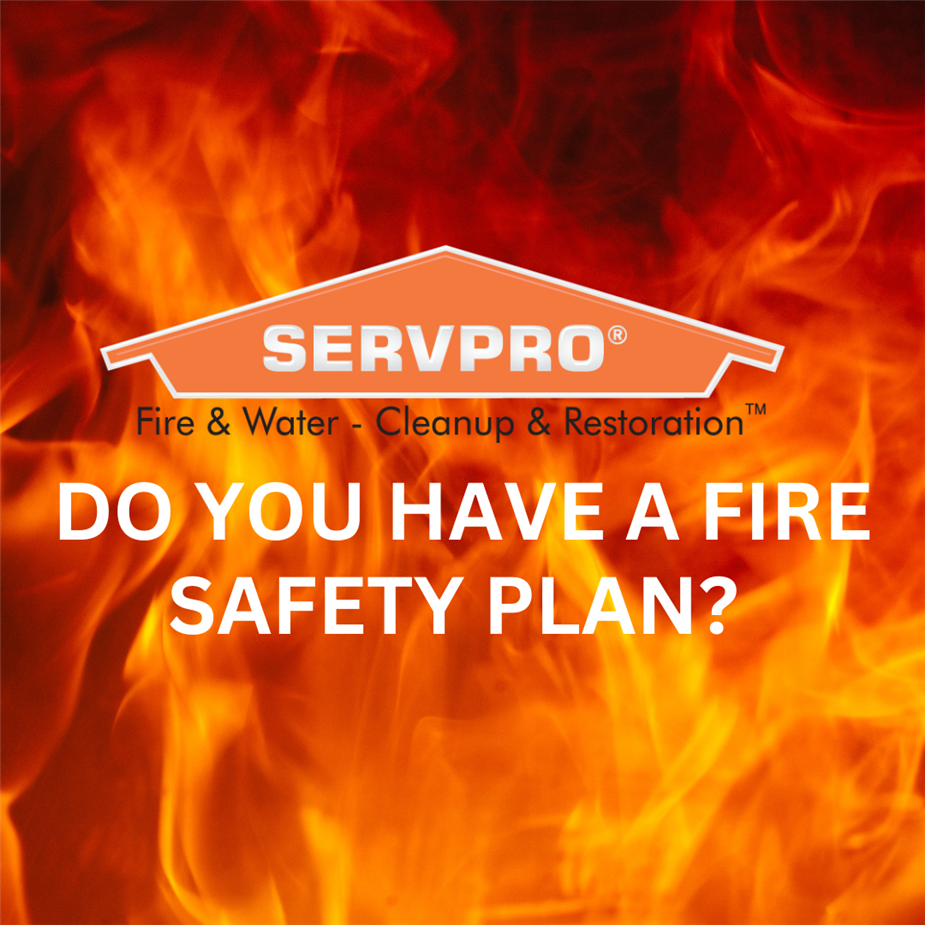 A fire safety plan is essential for keeping you and your loved ones safe during a fire.
A fire safety plan is essential for keeping you and your loved ones safe during a fire.
A fire safety plan can help you and your loved ones stay safe during a fire. It can also help prevent injuries and property damage by ensuring that everyone knows what to do in the event of a fire.
How to create a fire safety plan
- Draw a floor plan: Start by drawing a floor plan for your home or workplace. Identify all exits, including doors and windows, and ensure they are easily accessible.
- Determine a meeting place: Choose a safe meeting place outside of your home or workplace where everyone can gather after evacuating. This could be a neighbor's house, a street corner, or a nearby park.
- Assign responsibilities: Assign responsibilities to each person in your household or workplace. This could include tasks such as calling 911, grabbing important documents or belongings, or assisting others in evacuating.
- Practice evacuation drills: Regularly practice evacuation drills with everyone in your household or workplace. This will help ensure that everyone knows what to do in the event of a fire and can evacuate safely and quickly.
- Install smoke detectors: Install smoke detectors on every level of your home or workplace and test them regularly to make sure they are working correctly. Replace the batteries at least once a year.
- Know how to use a fire extinguisher: Make sure that everyone in your household or workplace knows how to use a fire extinguisher and where it is located.
- Review and update the plan: Regularly review and update your fire safety plan to ensure that it is still relevant and effective. Make changes as necessary, such as adding new exits or changing responsibilities.
A fire safety plan is essential for keeping you and your loved ones safe during a fire. By creating a plan and regularly practicing evacuation drills, you can increase your chances of getting out safely and prevent injuries and property damage.
We service Needham Junction, Needham, Newton Highlands, Newton Lower Falls, Newton Upper Falls, Thompsonville, Waban, and Wellesley, MA
SERVPRO Of Newton Wellesley is The #1 Choice in Cleanup and Restoration for residential and commercial buildings’ fire, mold, water, and storm damage.
What Are The Causes Of Fire?
2/15/2023 (Permalink)
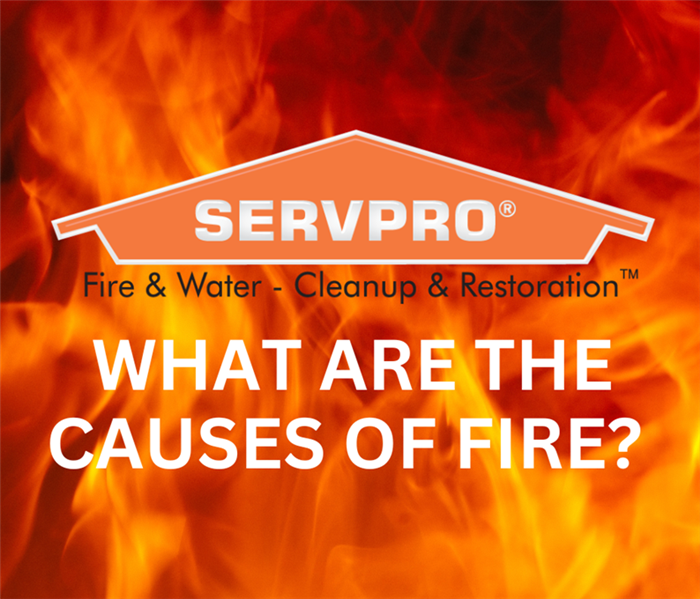 Fires are a natural disaster that can have significant impacts on people, animals, and the environment.
Fires are a natural disaster that can have significant impacts on people, animals, and the environment.
Fires are natural disaster that can occur in many different forms, from small brush fires to large-scale forest fires. They can happen at any time, and they can be devastating in terms of the damage they can cause to property, natural habitats, and human lives. In this blog post, we will explore some of the key aspects of fires, including their causes, impacts, and prevention.
Causes of Fires
Fires can be caused by a wide range of factors, including natural causes such as lightning strikes, as well as human activities such as campfires, cooking, and smoking. In some cases, fires can also be caused by electrical faults or mechanical failures, such as faulty wiring or overheated equipment. In recent years, climate change has been identified as a major contributor to the increased incidence and severity of fires, as rising temperatures and changing weather patterns have created more favorable conditions for fires to occur.
Impacts of Fires
The impacts of fires can be far-reaching and long-lasting, affecting everything from the immediate safety of people and animals to the long-term health of ecosystems. In the short term, fires can cause injury and death to people and animals, as well as damage to property and infrastructure. In the long term, fires can have significant impacts on natural habitats, including loss of vegetation, changes in soil composition, and loss of biodiversity. Fires can also have a significant impact on the climate, releasing large amounts of carbon dioxide and other greenhouse gases into the atmosphere.
Prevention of Fires
Preventing fires requires a multi-faceted approach, including education, awareness, and proactive measures. This includes educating people about the risks and causes of fires, as well as providing information on how to prevent them. Some of the key preventative measures include regular maintenance of electrical equipment, avoiding open fires in high-risk areas, and ensuring that campfires are extinguished completely before leaving the site. Other important steps include monitoring weather conditions and fire danger ratings, as well as being prepared to evacuate in the event of an emergency.
Fires are a natural disaster that can have significant impacts on people, animals, and the environment. While they can be difficult to prevent, there are many steps that can be taken to reduce the risk of fires and mitigate their impacts. By working together and taking a proactive approach to fire prevention, we can help to protect our communities, natural habitats, and the planet as a whole.
SERVPRO of Newton Wellesley is your premier choice for fire damage and restoration. Our teams are ready to respond 24 hours a week, any day of the year. When you bring us on the job our team of licensed contractors and certified technicians will work collaboratively with you throughout the duration of the project. They will keep you updated on the project's status and ensure that your expectations are met. We will help you to move forward and make it “Like it never even happened” for all of your fire damage.
SERVPRO of Newton Wellesley: How to Deal with Fire in the Workplace: Tips and Strategies
2/5/2023 (Permalink)
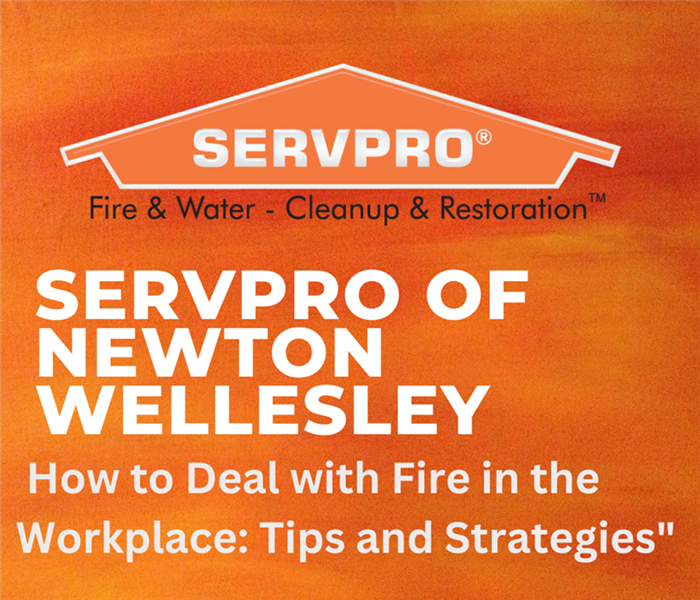 By following these tips and strategies, you can help prevent damage, minimize injury, and ensure the safety of everyone in your workplace.
By following these tips and strategies, you can help prevent damage, minimize injury, and ensure the safety of everyone in your workplace.
A fire can happen at any time and place, and it is crucial for businesses to be prepared. Having a fire response plan in place can help prevent damage, minimize injury and ensure the safety of everyone in the workplace.
Here are some tips and strategies to help you deal with fire in your business:
- Establish a fire response plan: This should include the proper procedures to follow in case of a fire, such as evacuation procedures, and the designated meeting place for employees after evacuation.
- Install fire alarms and fire suppression systems: Fire alarms should be placed throughout the workplace, and fire suppression systems such as sprinklers should be installed to help put out the fire.
- Regularly inspect and maintain fire equipment: Regular inspections and maintenance of fire alarms, fire suppression systems and other fire equipment is essential to ensure they are functioning properly and can be used in the event of a fire.
- Conduct regular fire drills: Regular fire drills are important to help employees understand what to do in the event of a fire, and to ensure that everyone is prepared.
- Store flammable materials properly: Flammable materials should be stored in fireproof cabinets, away from heat sources and potential sources of ignition.
- Train employees: Employees should be trained on the proper procedures to follow in case of a fire, including how to evacuate the building, how to use fire extinguishers, and how to report the fire.
- Have an emergency evacuation plan: An emergency evacuation plan should be in place and clearly communicated to all employees. This should include the designated meeting place for employees after evacuation.
By following these tips and strategies, you can help prevent damage, minimize injury, and ensure the safety of everyone in your workplace.
SERVPRO of Newton Wellesley is your premier choice for fire damage and restoration. Our teams are ready to respond 24 hours a week, any day of the year. When you bring us on the job our team of licensed contractors and certified technicians will work collaboratively with you throughout the duration of the project. They will keep you updated on the project's status and ensure that your expectations are met. We will help you to move forward and make it “Like it never even happened” for all of your fire damage.
SERVPRO of Newton Wellesley Shares How to Deal with Fire and Smoke Damage in a Home or Business
1/7/2023 (Permalink)
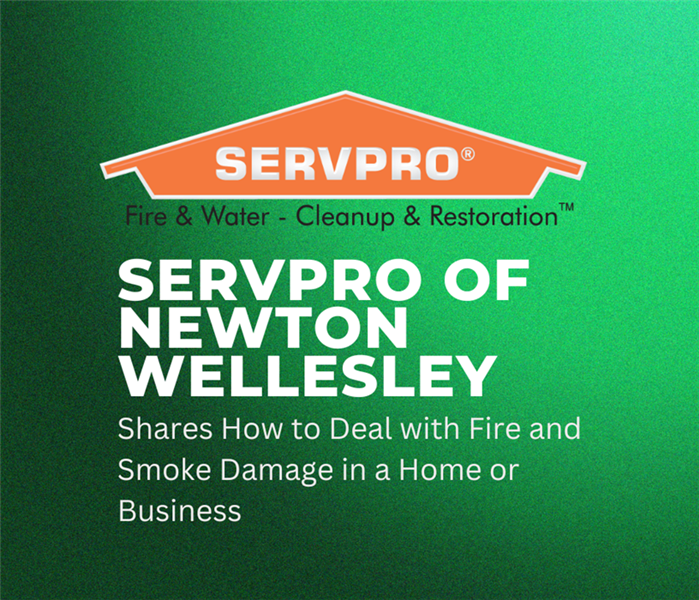 Smoke and fire damage situation is different for everyone, each situation requires a unique solution tailored to the specific conditions.
Smoke and fire damage situation is different for everyone, each situation requires a unique solution tailored to the specific conditions.
It is not common for fire loss, soot damage, or smoke damage problems to occur. However, trying to get things back in order is daunting and traumatic.
Things can be gone in a matter of minutes without any preparation for fire loss.
When a firefighter enters a fire in a home or business property, their first defense is to use lots of water to extinguish the fire. The steps that firefighters take to control the fire will leave back ashes, fire loss, soot damage, smoke damage or air quality problems. You will need to hire a professional to get the remainder of the damage taken care of. SERVPRO of Newton Wellesley is trained in a variety of different related clean-up including the latest professional equipment, tools, and procedures.
With our fire cleanup efforts, the business can get back to business as soon as it is physically possible.
Smoke and fire damage situation is different for everyone, each situation requires a unique solution tailored to the specific conditions.
SERVPRO of Newton Wellesley is your premier choice for fire damage and restoration. Our teams are ready to respond 24 hours a week, any day of the year. When you bring us on the job our team of licensed contractors and certified technicians will work collaboratively with you throughout the duration of the project. They will keep you updated on the project's status and ensure that your expectations are met. We will help you to move forward and make it “Like it never even happened” for all of your fire damage.
SERVPRO of Newton Wellesley Gives Holiday Safety Advice
12/4/2022 (Permalink)
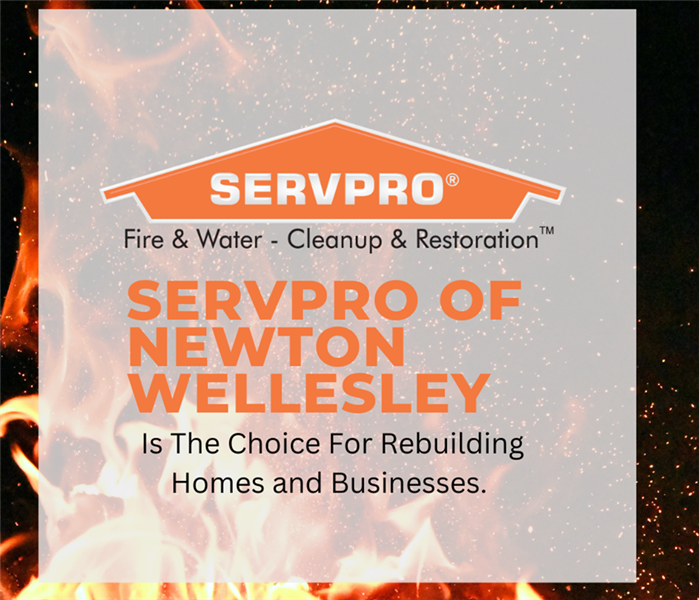 You can avoid those dangerous situations while decorating the Christmas tree with proper preparation and safe practices.
You can avoid those dangerous situations while decorating the Christmas tree with proper preparation and safe practices.
It is everyone’s favorite time of the year! With Christmas, there can be more fires than normal. Christmas lights make the holiday season bright; we decorate trees and homes with lights.
These decorations can have a risk though and electrocution is possible. With proper preparation and safe practices, you can avoid those dangerous situations while decorating.
Here are the safety tips you need to know.
- A missing or broken bulb can lead to shocks or even fires.
- Replace any broken bulbs before you string up your home or tree.
- If you decorate your home's exterior, make sure to use a ladder that isn’t metal.
- Make sure to use lights that are labeled indoors for your indoor lights and ones labeled outdoors for your outdoor lights.
- Check to make sure your lights are labeled as waterproof, especially outdoors.
- Always use an extension cord that is rated for outdoor use.
- Keep your cords from sitting on the ground.
- Make sure your light cord and your extension cord stay out of puddles or snow.
- Keep your light strands off the ground.
- Don't make your lights a year-long attraction. Lights, including smart lights, should not be used for long terms.
- Leave cords out of doors and windows. The cord could become pinched. This can ruin the insulation around the wires and lead to a shock.
Should you experience a fire, call 911 immediately and call your local fire restoration company.
SERVPRO of Newton Wellesley is your premier choice for fire damage and restoration. Our teams are ready to respond 24 hours a week, any day of the year. When you bring us on the job our team of licensed contractors and certified technicians will work collaboratively with you throughout the duration of the project. They will keep you updated on the project's status and ensure that your expectations are met. We will help you to move forward and make it “Like it never even happened” for all of your fire damages.
Fall Safety From SERVPRO of Newton Wellesley
10/5/2022 (Permalink)
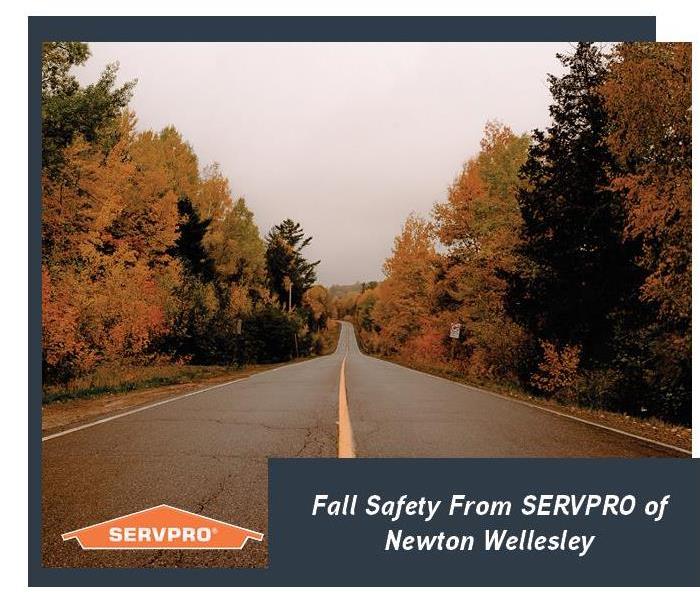 It is a good idea for everyone in their home to refresh their fall fire safety tips.
It is a good idea for everyone in their home to refresh their fall fire safety tips.
Now that fall is here, it is a good idea for everyone in your home to refresh their fall fire safety tips.
These fire tips are especially important for children and families.
- Check Smoke Detectors & Fire Extinguishers.
- Change batteries in smoke detectors and carbon monoxide detectors.
- Verify that smoke detectors are working.
- Make sure that there are smoke detectors in your home.
- Make sure everyone knows how to use a fire extinguisher.
- Make Sure All Heating Sources Work Properly
- Verify that everything you need to keep your home warm throughout fall and winter is working.
- Make sure that any space heaters are surrounded by at least three feet of empty space.
- Never place clothing or any other objects on a space heater.
- Do not place space heaters near furniture or drapery.
If you aren’t sure about any of these tips, reach out to a local firefighter, they will be able to assist you and answer any questions.
SERVPRO of Newton Wellesley is your premier choice for restoration and rebuild. Our teams are ready to respond 24 hours a week, any day of the year. When you bring us on the job our team of licensed contractors and certified technicians will work collaboratively with you throughout the duration of the project. They will keep you up to date on the status of the project and make sure that your expectations are met. We will help you to move forward and make it “Like it never even happened” for all of your storm damage.
SERVPRO of Newton Wellesley Talks About Campfire Safety
8/8/2022 (Permalink)
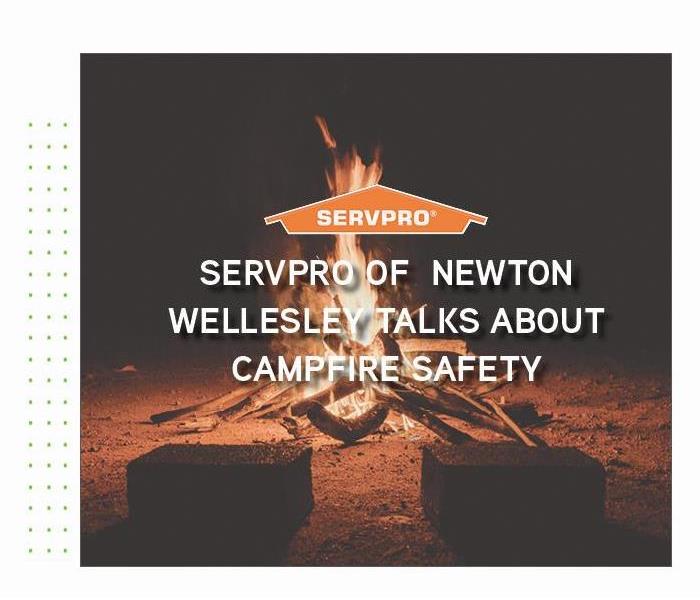 Enjoying a campfire is one of the most enjoyable parts of summer. A campfire that is not properly built can be dangerous.
Enjoying a campfire is one of the most enjoyable parts of summer. A campfire that is not properly built can be dangerous.
Enjoying a campfire is one of the most enjoyable parts of summer. A campfire that is not properly built, maintained, and extinguished can quickly become a hazard. It's important to understand how to safely enjoy your campfire.
- Know the rules: Before you strike a match, make sure you know the fire regulations of the campground or wilderness area.
- Use the pit: Most campgrounds provide a fire pit to build a campfire. If a pit is provided, this is the only place you should build a campfire. If not, dig a fire pit in an open area away from overhanging branches and power lines.
- Build a safe campfire: Start the fire with dried leaves or grass that will easily catch fire. Next, add small twigs and sticks that are less than an inch. As the fire builds, add the largest pieces of wood to the fire. This keeps the fire burning for a longer period of time.
Keep in mind that your fire does not have to be roaring. In fact, a small fire surrounded by rocks will do the job. Always make sure to take caution whenever you are creating a fire.
SERVPRO of Newton Wellesley is available 24/7 including holidays and weekends to assist you and help you with your commercial damage. “Like it never even happened.”
SERVPRO of Newton Wellesley Shares Spring Fire Safety
4/15/2022 (Permalink)
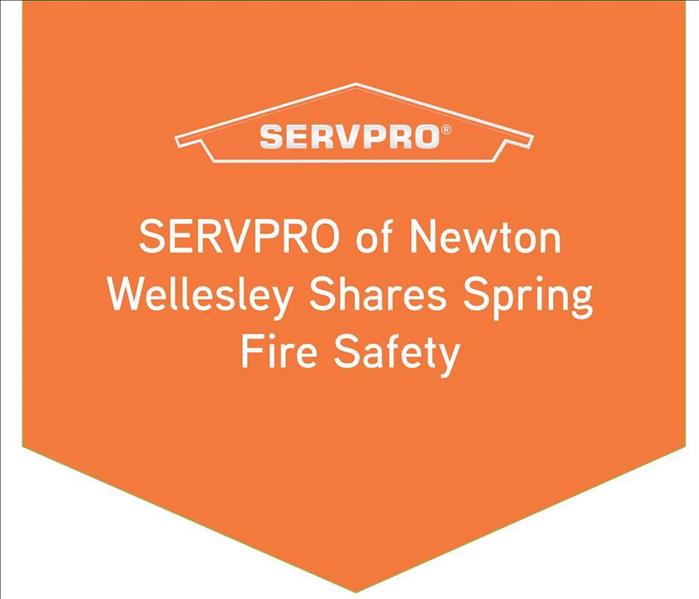 Losing everything to a fire is a devastating experience. This is why you should protect your building whenever possible. These simple tips might help
Losing everything to a fire is a devastating experience. This is why you should protect your building whenever possible. These simple tips might help
The last thing that anyone wants is fire damage to their property. Preventing a fire is possible.
Here are some tips to help you prevent fires:
- Ensure all your heating sources are working properly: Make sure to change air filters regularly.
- Clean your stove and oven: Food particles that accumulated at the bottom of the burner could culprit.
- Pay attention when cooking: Never leave cooking unattended.
- Check your dryer’s airflow: Make sure your vents are not clogged.
- Store flammable products safely: Household cleaners are flammable products. They can combust when placed too close to a large heat source.
- Use caution with candles: Always put the candles out if you are not in the room.
Losing everything to a fire is a devastating experience. This is why you should protect your building whenever possible. These simple tips might help you prevent a fire.
SERVPRO of Newton Wellesley is available 24/7 including holidays and weekends to assist you and help you with fire damage. “Like it never even happened.”
SERVPRO of Newton Wellesley Shares Spring Cleaning Tips
4/13/2022 (Permalink)
 Check Smoke and Carbon Monoxide Detectors to prevent fires.
Check Smoke and Carbon Monoxide Detectors to prevent fires.
Most look at spring cleaning as a chance to remove dust from places and go through boxes stacked in their garage, it’s also important that you pay attention to fire safety.
Here are a few tips for you to follow:
- Check Smoke and Carbon Monoxide Detectors: Replace the batteries and make sure to also test each one.
- Make Your Kitchen Safe: Spills in your kitchen increase the likelihood of a fire. Clean up spills right away to keep grease from collecting on your counters.
- Inspect Electrical Cords: Electrical cords can become damaged and frayed over time. If they are damaged, replace them immediately.
SERVPRO of Newton Wellesley is available 24/7 including holidays and weekends to assist you and help you with fire damage. “Like it never even happened.”
SERVPRO of Newton Wellesley Shares Fire Safety Information
4/13/2022 (Permalink)
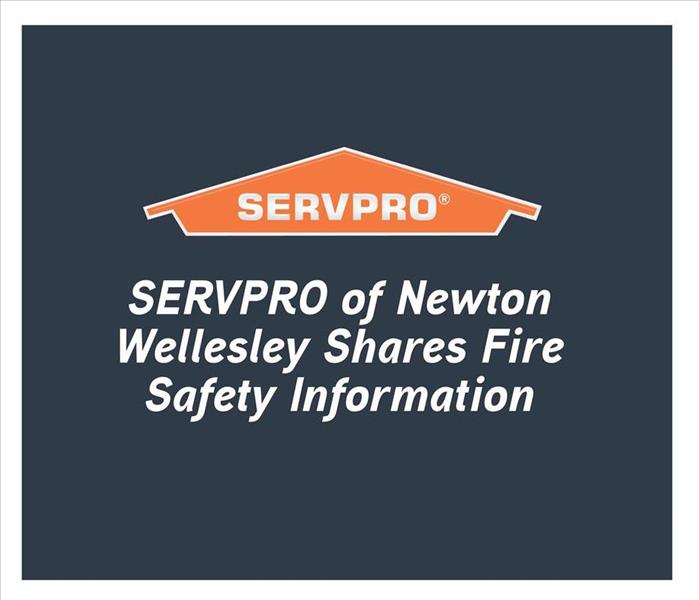 A fire disaster can cause damage to the structure of your home
A fire disaster can cause damage to the structure of your home
In your lifetime you hope to never experience fire damage to your home. A fire disaster can cause damage to the structure of your home.
Here are some tips for fire safety:
- Working smoke alarms give you early warning so you can get out.
- A closed-door may slow the spread of smoke, heat, and fire.
- Install smoke alarms in every sleeping room.
- Large homes may need extra smoke alarms.
- Test all smoke alarms at least once a month.
- A smoke alarm should be on the ceiling or high on a wall.
- Keep smoke alarms away from the kitchen; they should be at least 10 feet from the stove.
- Replace all smoke alarms when they are 10 years old.
Smoke alarms are an important part of a home fire escape plan, so make sure that you follow these few tips.
SERVPRO of Newton Wellesley is available 24/7 including holidays and weekends to assist you and help you with fire damage. “Like it never even happened.”
SERVPRO of Newton Wellesley Shares Grill Safety Tips
4/13/2022 (Permalink)
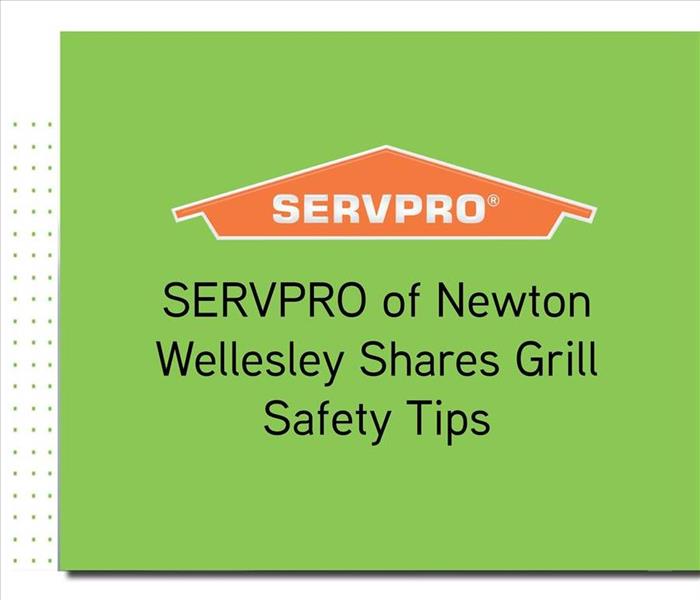 It’s important to follow a few safety tips before firing up the grill to help prevent fires.
It’s important to follow a few safety tips before firing up the grill to help prevent fires.
Springtime is here, and that means grilling is happening more. It’s important to follow a few safety tips before firing up the grill to help prevent fires.
- Only use your grill outside.
- Keep the grill at least 3 feet from siding, deck rails, and eaves.
- Open your gas grill before lighting.
- Keep an eye on your grill, fire pit, or patio torches.
- Clean your grill after each use; this will remove grease that can start a fire.
We know that fires can happen, but it is important to take precautions whenever possible.
SERVPRO of Newton Wellesley is available 24/7 including holidays and weekends to assist you and help you with fire damage. “Like it never even happened.”
SERVPRO of Newton Wellesley Talks About Fire Damage
2/6/2022 (Permalink)
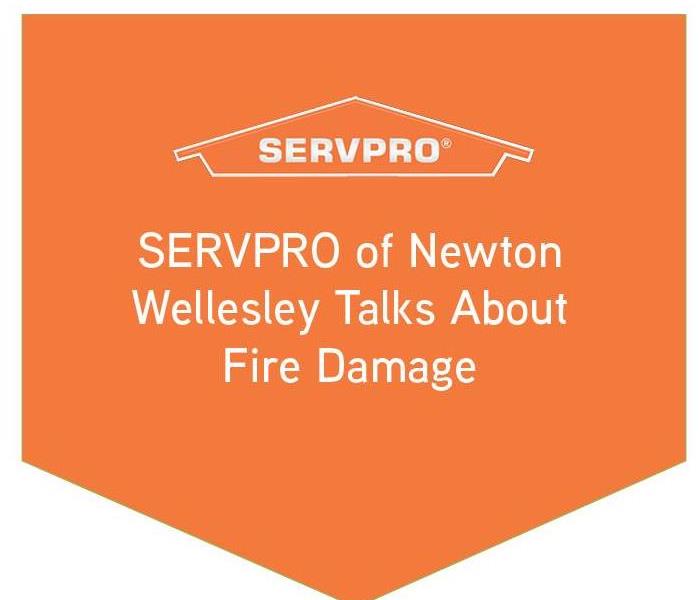 Fires are a horrible disaster, it is important to know how to prevent one and share with others too.
Fires are a horrible disaster, it is important to know how to prevent one and share with others too.
Our homes have more electricity than ever before. If things are not running properly a fire can break out. Here are some tips to help prevent a fire.
- Check outlets for loose-fitting plugs.
- Don’t force plugs into outlets.
- Make sure cords are not frayed.
- Extension cords are designed for temporary use only.
- Light bulbs should be the correct wattage for the fixture’s design.
- Install Ground Fault Circuit Interrupters.
- Loose wires or fixtures are common flashpoints for fires.
Fires are a horrible disaster, it is important to know how to prevent one and share with others too. At least once a month you should check on these items to ensure that everything is working properly and smoothly.
SERVPRO of Newton Wellesley is available 24/7 including holidays and weekends to assist you and help you with your fire damage. “Like it never even happened.”
SERVPRO of Newton Wellesley Shares The Top Firesafety
2/6/2022 (Permalink)
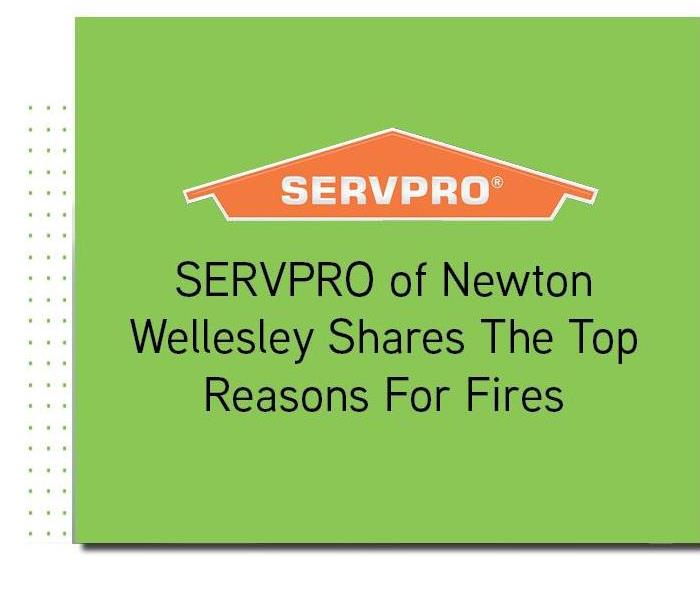 The key to fire prevention is knowing the most common causes, so you can help prevent it as best as you can.
The key to fire prevention is knowing the most common causes, so you can help prevent it as best as you can.
Fires are impossible to prevent, there are still some important factors to understand. The key to fire prevention is knowing the most common causes, so you can help prevent it as best as you can.
Here are the top causes of fires:
- Cooking: Never leave a stove unattended.
- Smoking: An unattended burning cigarette can ignite a serious fire.
- Heating: Space heaters are extremely flammable; keep them away from the furniture.
- Electrical: A power cord can have your home in flames in a short amount of time.
- Candles: Always ensure all candles are blown out before leaving the room.
- Dryers: Dryers are loaded with debris, and are highly flammable. Remove the lint screen after every use.
SERVPRO of Newton Wellesley is available 24/7 including holidays and weekends to assist you and help you with your damage. “Like it never even happened.”
SERVPRO of Newton Wellesley Shares Fire Extinguisher Use And Safety
2/6/2022 (Permalink)
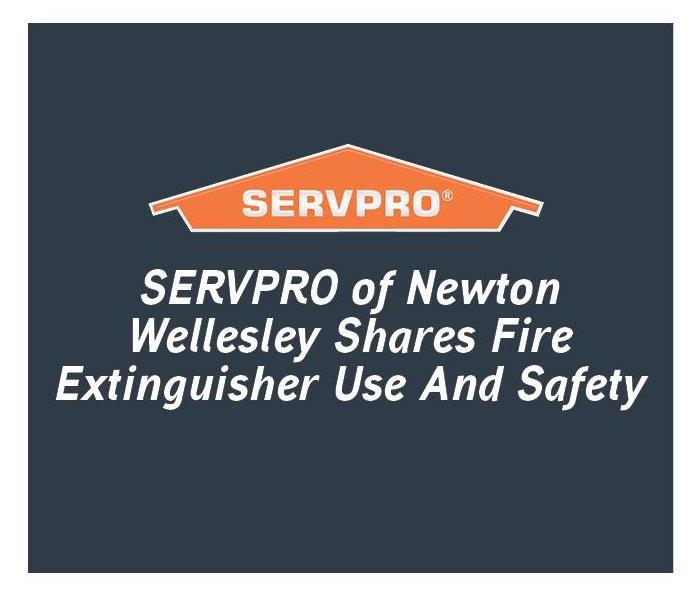 Make sure to read the instructions on the fire extinguisher. You will want to become familiar with it before a fire breaks out.
Make sure to read the instructions on the fire extinguisher. You will want to become familiar with it before a fire breaks out.
A portable fire extinguisher can be a saving tool should a fire arise. Here are some quick tips on how you can use a fire extinguisher correctly:
- Pull the pin and release the locking mechanism.
- Aim low, and then point at the base of the fire.
- Squeeze the lever slowly and evenly.
- Sweep from side to side.
Make sure to read the instructions on the fire extinguisher. You will want to become familiar with it before a fire breaks out. Also, it is important to encourage family members and coworkers to become familiar with it.
Remember, extinguishers do have their limitations! It is also important to ensure you have the correct type of extinguisher for your home or facility.
SERVPRO of Newton Wellesley is available 24/7 including holidays and weekends to assist you and help you with your fire damage. “Like it never even happened.”
Fire prevention tips for your business in Newton Wellesley.
8/6/2021 (Permalink)
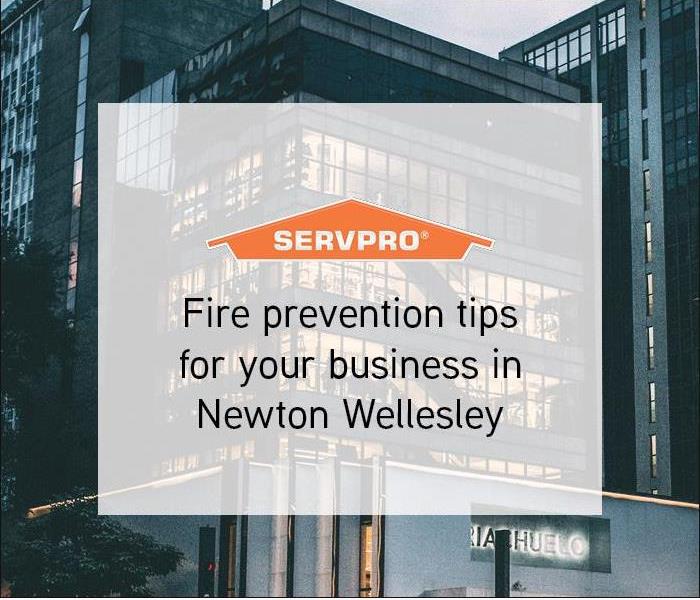 These are quick and simple fire tips should your business ever need them. If you are looking for help in creating an Emergency Readiness Plan.
These are quick and simple fire tips should your business ever need them. If you are looking for help in creating an Emergency Readiness Plan.
A fire can cause severe damage to business structures, equipment, and even inventory. A business owner should focus on fire risk assessment, fire prevention, and staff education to help reduce the chance of fire and smoke damage.
Here are three tips to consider:
1. Have fire protection equipment: You might want to look into an automatic sprinkler system, this will provide primary fire protection for your business. Let employees be aware of the location of fire extinguishers throughout the building.
2. Fire safety in the workplace: Your employees are part of your team but they’re also essential assets to your business. Ensure that your employees know what to do if there's a fire. You will want to conduct a fire drill several times a year to keep employees aware of safety protocol.
3. Evacuation plan: Every business should post a fire evacuation plan in several spots around the workplace. In case of fire injuries, your staff should be familiar with the location of the first-aid kit.
These are quick and simple fire tips should your business ever need them. If you are looking for help in creating an Emergency Readiness Plan, contact us today for no cost.
SERVPRO of Newton Wellesley is available 24/7 including holidays and weekends to assist you and get your commercial building back to “Like it never even happened.”
Three Reasons Why Water Damage Follows A Fire
4/29/2021 (Permalink)
It is hard to know what to expect after a fire. As an owner or property manager, you likely expect significant equipment loss because of fire and smoke damage, but what about water? Ask any disaster restoration company in and they will tell you water and fire damage go hand-in-hand. There are at least three causes of water damage during and after a commercial property fire.
- Hoses
- Suppression systems
- Pipe damage
Hoses
The primary source of water loss during a fire rescue may come from a fire hose. These large-diameter, high-pressure hoses can expel hundreds of gallons of water per minute to flood and extinguish the flames. Unfortunately, extinguishing the blaze also floods your facility, and depending on the size and extent of the fire, you may have significant property loss.
Suppression Systems
Water-based suppression systems can also lead to extensive flooding. However, the extent of flooding caused by these systems depends on the type. Some systems do not use water. Other systems that use water may only release sprinklers in areas where fire damage is occurring, leaving other spaces dry.
Pipe Damage
Water damage can also occur because of damaged pipes. The temperatures in violent fires often reach the melting points of certain metals. If the fire reaches these temperatures, pipes may melt, warp or break. Since no one is in the facility, there is no way to shut off the water supply, meaning that water can flow freely from pipes until the system is shutdown.
Commercial property owners should have concerns over water and fire damage if such a disaster occurs. Knowing that one problem can lead to the other may allow you to better prepare for emergencies.
If your commercial or residential property experiences fire damage we are hear to help. Call the fire remediation AND water remediation experts of SERVPRO of Newton/Wellesley to remediate the water damage. and to determine the cause of the burst pipe at (617) 332-9000. We will make it, "Like it never even happened."
What to do if a fire starts in Newton, Wellesley
4/29/2021 (Permalink)
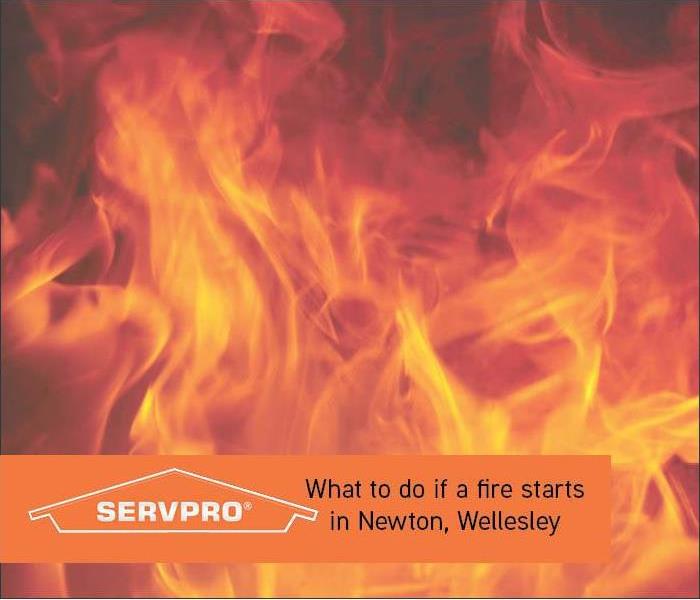 If you find yourself in need of fire restoration to your home or business, give SERVPRO Newton, Wellesley a call.
If you find yourself in need of fire restoration to your home or business, give SERVPRO Newton, Wellesley a call.
Fires can happen at any time, anywhere, yes that means your home or business. It is one of those things no one can really prepare for, we can only try to understand what to do if a fire happens since they are predictable.
However, it is great to know the basics of what to do if a fire starts for your own safety:
- Make sure you are able to operate a fire extinguisher. You should have a few that are easily accessible.
- GET OUT and STAY OUT. CALL 9-1-1 immediately. Do not go back in whatsoever.
- Use the stairs instead, if you are in a building with elevators. Leave all your things where they are and get out. Make sure you are far enough away from the building once you are outside.
- Do not open doors if they are warm or you can see the smoke. You will want to use the second way out if you arent able to get out the primary way.
- If there is smoke and you are trying to exit, you will want to make sure to go under the smoke to your exit. Close any doors behind you.
- If smoke, heat, or flames are blocking your exit routes stay in the room with doors closed. Place a wet towel under the door and call the fire 9-1-1. In the meantime, open a window.
Don’t forget if you are a business owner and do not have an Emergency Readiness Plan, we suggest setting one up. It will help in times with this to ensure you have an emergency plan ready for your staff. We at SERVPRO Newton, Wellesley can help guide you and set it up.
If you find yourself in need of fire restoration to your home or business, give SERVPRO Newton, Wellesley a call at (617) 332-9000, we respond faster to any size disaster.
Fire Safety Tips for Newton, Wellesley
4/29/2021 (Permalink)
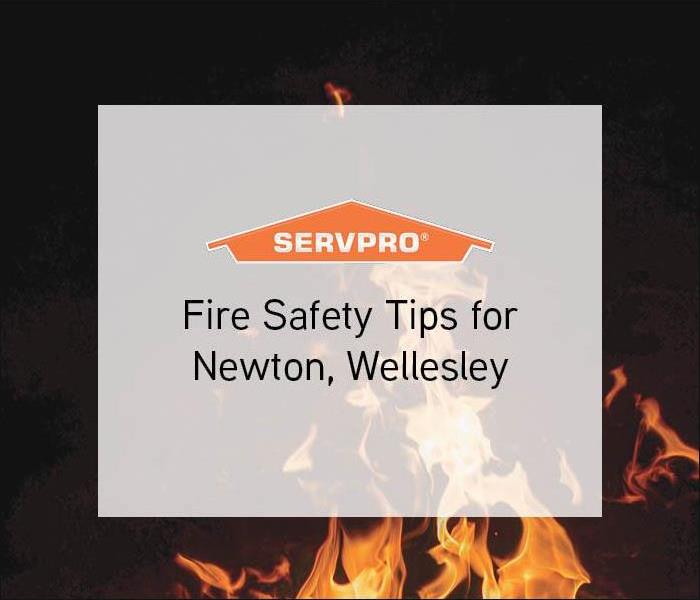 If you find yourself in need of fire restoration to your home or business, give SERVPRO Newton, Wellesley a call.
If you find yourself in need of fire restoration to your home or business, give SERVPRO Newton, Wellesley a call.
Fires are very dangerous and horrible. However, it is hard to prevent a fire since it can happen at any time. There are a few simple quick tricks that you can do to prepare for a fire should the need arise.
- Install smoke alarms in every bedroom and on all levels of your home.
- Make sure to test smoke alarms every month. If they’re not working check the batteries, or get a new smoke detector.
- Check with family members about a fire escape plan. Make sure to practice the plan twice a year.
- Educate any children about what smoke alarms sound like, but also what to do if they hear one.
- Make sure to ensure that all household members know how to escape from every room of your home.
- Establish a family emergency communications plan that everyone knows well.
- Enforce that everyone knows how to call 9-1-1, especially children.
If you find yourself in need of fire restoration to your home or business, give SERVPRO Newton, Wellesley a call at (617) 332-9000, we respond faster to any size disaster.
How To Clean Up Damage After a Fire
4/29/2021 (Permalink)
Fire cleanup takes place in multiple stages. When your commercial or residential property in Wellesley, MA, has water, fire and smoke damage, it all has to be dealt with before the building can be rebuilt. Fire restoration specialists take several steps to make sure your building is restored fully.
Water Damage
Before technicians can get to the soot damage caused by the fire, they typically have to address the problems the water used to extinguish the fire left behind. Firefighters must use water liberally to ensure that all flames are extinguished, and this can lead to a lot of water damage. Our certified Disaster Remediation Teams will inspect and tear out all materials affected:
- Drywall
- Insulation
- Tile
- Carpet
- Textiles
Fire Damage
At the same time as the water damage removal is happening, part of our team will begin to remove materials with fire damage. If a support beam is burned beyond repair, for example, it has to go. Temporary supports are installed in its place until the final stage of the process when it can be rebuilt.
Soot Damage
The last step of the cleanup phase is soot and smoke damage cleaning. During a fire, these particles get everywhere. They don't just land on surfaces. They also get trapped in corners and cracks. It is not unusual to even find soot damage under floor tiles or in air ducts. To infiltrate all the areas that smoke and soot can go, a thermal fogger may need to be used. It disperses the cleaning agent the same way that a fire disperses smoke so that the detergent can get to every place the particles are hiding. Afterward, an ozone machine may be used to clean the remaining odor from the air.
If your commercial or residential property experiences fire damage we are hear to help. Call the fire remediation AND water remediation experts of SERVPRO of Newton/Wellesley to remediate the water damage. and to determine the cause of the burst pipe at (617) 332-9000. We will make it, "Like it never even happened."
3 Fire Risks
2/9/2021 (Permalink)
There are many different types of accidents that can potentially lead to a fire in your Thompsonville, Ma home. Which is why it is important to always be aware of potential hazards in your home. Three common causes of home fires include cooking, a cigarettes, and candles. Here are some ways to protect your family and its greatest investment.
Kitchen Fire
From leaving cooking food unattended to accidentally allowing grease to splatter, there are many opportunities for a fire to start in your kitchen. Always make sure to stay near food whenever you are cooking and never leave food in the oven or in a slow cooker when you leave the house. Keep all flammable objects off the stove. When cooking with oil, have a lid nearby and don’t overheat the grease.
Smoking Indoors
Cigarette fires are a leading cause of residential fire deaths, which is why it is important to always practice safe smoking habits. While only smoking outdoors is the best way to prevent a fire from starting indoors, bedrooms should be kept completely off-limits. Steer clear of all flammable objects and make sure to avoid an ashtray fire by always putting out butts and properly disposing of ashtray contents.
Candles
Many people use candles around their homes. Always make sure to burn candles from away from flammable items, such as curtains and towels. Blow out candles before exiting a room, leaving the house, or falling asleep. Keep candles far out of reach from curious animals and children. Additionally, never let candles burn all the way down to avoid overheating the container.
These tips are all great ways to avoid accidental fires in your home. Safety first, but even after taking all of these necessary precautions a fire can still happen. If it does call the experts at SERVPRO of Newton/Wellesley at (617) 332-9000. We will make it, "Like it never even happened."
The Importance Of Fire Extinguishers
2/9/2021 (Permalink)
A fire extinguisher is a crucial piece of safety equipment that can save lives and spare your Needham, Ma commercial and residential properties from extensive damage mandating professional cleanup and restoration. This is why every property owner should maintain at least one functional device. To ensure it’s readily available in an emergency, every owner and manager should also recognize three key facts about this vital fire suppression tool.
Device Doesn’t Last Forever
Extinguishers do not have an indefinite shelf life. Unfortunately, they also do not typically come with an expiration date sticker.
To determine the viability of your device, you should complete annual inspections and check for compromised components. Specific defects that may make it unusable include a broken handle, missing locking pin or a cracked nozzle. The gauge should also be in the green. If it’s not, replace the device.
Multiple Types Exist
A fire extinguisher is designed to battle specific types of infernos. Class K units, for example, can douse a kitchen fire sparked by grease while a Class A device is designated for use with blazes involving ordinary combustibles, such as wood and paper. Additional distinctions include Class C for electrical fires and Class B for flammable liquids.
Attempting to smother flames with the wrong type of device can be ineffective. To combat this potential dilemma, evaluate your property's specific fire risks and purchase your extinguisher accordingly. Check the canister’s label to confirm the class. You can also purchase a multipurpose device, which can be used against a variety of blazes.
Should Be Accessible and Visible
Minimizing fire damage requires prompt action. To ensure an expedited response, mount your extinguisher in a safe, accessible place and post signage to identify its location. You should also ensure everyone in your family or all of your employees recognize this area and refrain from blocking the site. Because an inferno can erupt suddenly, having a functioning fire extinguisher easily accessible is a crucial safety strategy. Understanding key aspects of the device can ensure it’s in prime operating condition and ready to perform in an emergency.
If your commercial or residential property experience fire damage we are hear to help. Call the fire remediation experts of SERVPRO of Newton/Wellesley to remediate the water damage. and to determine the cause of the burst pipe at (617) 332-9000. We will make it, "Like it never even happened."
Smoke Alarm Maintenance
2/9/2021 (Permalink)
Most homeowners in Chestnut Hill, Ma, have at least one smoke alarm installed. In fact, this important piece of equipment is required by most fire ordinances. Many fire damage restoration professionals agree that proper maintenance can help ensure the alarms in your home remain in working order. Here are some tips you may wish to know.
When To Replace Alarms
A smoke detector is designed to have a long life, so you can expect yours to last for up to 10 years. Each alarm should have its manufacture date printed on the back so that you can check it if needed. If your alarm is over 10 years old, it may be time to consider a replacement.
When To Replace Batteries
Many experts recommend changing the batteries in your smoke alarm at least once a year. It’s recommended to choose a consistent time every year, such as daylight savings, so that it's easier to remember to change them out. After replacing the batteries, it’s advised to hit the test button on your alarm to help ensure the appliance is in working order.
Where To Install Alarms
One of the most commonly asked questions is where should alarms be installed in your home. Experts recommend installing them on every level of the home, inside each bedroom, and outside the bedrooms as well. For example, you can place a single alarm in the shared hallway outside several bedrooms with a smoke detector inside each individual bedroom. You may also want to include an alarm in your kitchen or main living area.
With the proper maintenance, your smoke alarm should stay in working condition for 10 years. If fire damage does strike your home we are hear to help. Call the fire remediation experts of SERVPRO of Newton/Wellesley to remediate the water damage. and to determine the cause of the burst pipe at (617) 332-9000. We will make it, "Like it never even happened."
Prevent Lightning Fires
8/11/2020 (Permalink)
Lightning strikes are rare, but when they hit, they can cause serious damage. Here are some tips to protect your Newton, MA commercial and residential property against a lightning fire.
Unplug All Electronics
If you know that a lightning storm is approaching your area, unplug all of your electronics. A power surge can severely damage the system of electrical wires throughout a property. It can also destroy the electronics themselves. like your TVs, computers and kitchen appliances.
Plan Ahead
If you are going on an extended vacation, it's a good idea to unplug your electronics to reduce the risk of a house fire.
Install a Voltage Surge Protector
There will be times when you are not able to unplug the electronics in your commercial or residential property. Installing surge protectors in the areas where electronics are positioned will limit the amount of voltage directed into the electronics.
Consider a Structural Protection System
A structural protection system combines aluminum material and highly conductive copper to provide a path of low resistance, which will safely ground dangerous electricity. Professionally systems are 99% effective in protecting against a lightning fire. Some insurance policies will even offer a discount if you install a protection system. Generally, a protection system can include the following elements:
- Lightning rods
- Grounds
- Bonds
- Main Conductors
Check Your Insurance Policy
Make sure your insurance policy covers damages from electrical storms. Some states are more prone to electrical storms, so it's critical that you are covered if you live in a high probability zone.
We’re Here for You
Even if you take every precaution, a lightning fire may still damage your commercial or residential property. The Disaster Remediation Teams at SERVPRO of Newton/Wellesley has specialized training and experience in fire damage cleanup. When a lightning fire damages your commercial or residential property call the experts at SERVPRO of Newton/Wellesley, (617) 332-9000. We will make it "Like it never even happened."
Safety in the Home
4/26/2019 (Permalink)
Keep your family safe from fire. Be aware of the hazards in your home. And, be sure to have an escape plan. Pull together everyone in your household and make a plan. Walk through your home and inspect all possible exits and escape routes
Burn awareness Most “fire-related injuries” are burns. Make sure kids stay more than 3 feet away from the stove. Most “fire-related injuries” are burns. In fact, approximately every 60 seconds someone in the U.S. sustains a burn injury serious enough to require treatment.*
Dryers and washing machines The leading cause of home clothes dryer and washer fires is failure to clean them.
- Clothes dryers accounted for 92% of the fires; washing machines 4%, and washer and dryer combinations accounted for 5%.
- The leading factor contributing to the ignition of home fires involving clothes dryers was failure to clean, accounting for one-third (33%) of dryer fires.
- A mechanical or electrical failure or malfunction was involved in the vast majority of home fires involving washing machines.
- Fires involving clothes dryers usually started with the ignition of something that was being dried or was a byproduct (such as lint) of drying, while washing machine fires usually involved the ignition of some part of the appliance.
Escape planning Learn the steps to create and practice a home fire escape plan. Fire can spread rapidly through your home, leaving you as little as one or two minutes to escape safely once the smoke alarm sounds. A closed door may slow the spread of smoke, heat and fire. Install smoke alarms in every sleeping room and outside each separate sleeping area. Install alarms on every level of the home. Pull together everyone in your household and make a plan. Walk through your home and inspect all possible exits and escape routes. Households with children should consider drawing a floor plan of your home, marking two ways out of each room, including windows and doors.
Gasoline & propane safety Always handle gasoline in the home or propane-powered equipment cautiously. Handle any propane-powered equipment cautiously and always follow the manufacturer's instructions.
- Cylinder tanks for equipment such as stoves and ovens must be located outside of the home.
- Keep gasoline out of children's sight and reach. Children should never handle gasoline.
- If fire does start while handling gasoline, do not attempt to extinguish the fire or stop the flow of gasoline. Leave the area immediately, and call for help.
- Do not use or store gasoline near possible ignition sources (i.e., electrical devices, oil- or gas-fired appliances, or any other device that contains a pilot flame or a spark).
Hoarding and fire safety Many fire departments are experiencing serious fires, injuries, and deaths as the result of compulsive hoarding behavior. The excessive accumulation of materials in homes poses a significant threat to firefighters fighting fires and responding to other emergencies in these homes and to residents and neighbors.
Holiday Safety
12/11/2018 (Permalink)
According to the National Fire Protection Agency U.S. fire departments responded to an estimated annual average of 200 Christmas tree related home fires during the holiday season. In total, the average annual property damage is over $14 million dollars! While such fires are uncommon they are more likely to result in civilian death. A death occurs in 3% of reported Christmas tree fires. By comparison a fatality occurs in only ½% of all other reported home fires. The reason for this discrepancy, Christmas tree fires usually star overnight when trees are left lit. Remember to turn your tree lights off before going to bed and if your tree is natural make sure to water it regularly and dispose of it shortly after the holidays.
We at SERVPRO Newton / Wellesley wish you and yours a happy and safe holiday season!
Holiday Fire Hazards
12/11/2018 (Permalink)
The more holiday lights the better, right? Weather we are talking about strands of our favorite Christmas lights or holiday scented candles, one quarter of reported Christmas tree fires the result of electrical problems or heat sources too close to the tree (according to the NFPA). Be sure not to overload outlets with multiple strands of lights and make sure that the electrical wiring is up to current electrical code standards. Also, check the wiring to ensure that there are no frays or loose connections.
If candles are the way you light up your holidays then follow these two important safety tips. Do not leave candles lit when going to bed or if no one is home. Additionally, keep them a safe distance from anything flammable.
We at SERVPRO Newton / Wellesley wish you and yours a happy and safe holiday season!
Odor Penetration
10/12/2018 (Permalink)
Factors which Help Odors Penetrate
- Surface Porosity – The porous nature of building material varies – Hardwoods are less porous than soft wood. The types of paint used will change the porous nature of building materials. Flat paint does little to protect against odor penetration while paints with a high gloss finish may make a surface impervious to odor and moisture penetration. Items like carpet, drapes, and upholstery are all excellent vessels for odor retention.
- Heat - Heat causes porous surfaces to expand, allowing odors to penetrate even deeper. When heat is removed, the surfaces cool, contract, and trap the odor particles. This is why odors resulting from a fire are so pungent and challenging to neutralize.
- Heavy concentrations of residue - The more concentrated the residue from substances causing the odor, the greater the surface area of materials that it can impact.
- Exposure time - The longer a surface is exposed to odor particles, the greater the number of odor particles that will penetrate porous surfaces. The greater the number of odor particles that penetrate porous surface areas the stronger the odors are likely to be.
Environmental factors also influence our reception of odors. Odor molecules are very volatile; they vaporize easily. High humidity levels help dissolve and carry odor vapors to the nose. This makes odors in humid air seem stronger than those in dry air. Weather conditions thus impact how evident odors are to people; odors become more detectable by the nose as the humidity increases. Our technicians alert our clients about these potential environmental impacts. It is quite possible, even months later, for odors to reappear during times of increased humidity or temperature. That is not so say that the odor neutralization process was incomplete, but rather the environmental conditions have changed and become more conducive to odor reception. In some cases additional neutralization may be necessary.
Next up - Deodorization methods and basic procedures.
Odor Remediation
9/25/2018 (Permalink)
Odor remediation projects tend to be complex. Odors may be real or imaginary. Furthermore, interpretation of odor as good versus bad varies from client to client. As such every remediation project presents a unique set of challenges to our technicians. Over the coming weeks I would like to provide insight into some of these challenges and how to properly neutralize odor. To begin with we need to better understand how we as humans process odor, what odor is, why odor remains, and finally environmental conditions that may enhance our reception of odor.
Humans depend on their nose as the best “instrument” for detecting odor. Odors result from airborne chemicals, gases, or tiny particles. As we breathe, these substances are absorbed by the mucous membranes in our nose and mouth. Receptors in the nose send a message to the brain, where the odor sensation is interpreted. Each individual reacts to odors differently in detecting whether odors are present and how intense they are. Interestingly there are two types of odors — real and imagined.
- Real odor is the sensation of smell caused by a real substance. Odor molecules interact with olfactory nerve cells in the nose. The olfactory nerves send a message to the brain that is interpreted by the olfactory lobe.
- Imaginary or psychological odor is what people think they smell. They are stimulated by a given set of circumstances and strong impressions formed from similar circumstances before. Some people think they smell something because of the circumstances, not because of an odor actually being present. Imaginary odors are sometimes called heightened awareness odors, because circumstances have made the individual more aware of odor than he or she normally would be, and thus more likely to smell something that no one else smells.
Moreover, the term odor describes both good and bad smells. Whether an odor smells good or bad is in the mind of the individual. Some odors — such as putrefying flesh — are considered unpleasant by almost everyone. Other odors — such as gasoline or paint fumes— may be considered good odors by some people, but extremely offensive by others. The interpretation of whether a smell is good or bad differs from one individual to the next.
Odor particles are tiny. Tiny objects are measured in microns, and odor particles range in size from .1 (one tenth) of a micron to about four (4) microns. To put these sizes in perspective take a look at the period at the end of this sentence. That period is about 150 microns in size or 38 times bigger than the largest possible odor particle! The extremely small size of odor particles allows them to penetrate surfaces easily. It is this penetration into building materials and furniture which result in odors remaining in our environments. This is also what makes the odor neutralization process at times challenging.
NEXT - Factors which Help Odors Penetrate
SERVPRO of Newton / Wellesley To The Scene
2/20/2018 (Permalink)
SERVPRO of NEWTON/WELLESLEY was on scene to assist SERVPRO of FRAMINGHAM, our sister franchise, with a fire that was spotted in the early morning hours by a neighbor. No one was injured. The original newspaper article from the Metro West Daily News is below.
ASHLAND — Fire officials say they are grateful for a man walking his dog early Monday morning who spotted flames on a second-floor porch of a Tilton Avenue home, then banged on the building to wake up residents in two apartments.
Doug Duval said he was walking his miniature pinscher Ruby around 5 a.m. when he saw the fire at 25-27 Tilton Ave. It was dark outside and the Christmas lights looked strange, he said.
"When I got a little closer I could see it was fire," he said. "There were 10-foot flames shooting up the wall."
He tied Ruby to a fence on the property and jumped into action.
"I started banging on the side of the house yelling, 'fire, fire, fire!'" he said. "I woke the whole neighborhood."
A neighbor called 911 as the two apartments were quickly evacuated. The first floor homeowner and a neighbor got a fire extinguisher out of the garage to fight the flames, Duval said.
The Ashland Fire Department arrived to finish the job. Nobody was injured in the home and the fire was contained to the porch, according to fire Lt. David Iarussi. The neighbor who helped douse the flames was taken to MetroWest Medical Center in Framingham for a smoke-related evaluation.
Iarussi said the state fire marshal's office determined the cause to be careless disposal of a cigarette.
"The fire would have been much worse if it spread inside the house and the fire alarm went off," he said. "We wouldn't have known until the fire alarm went off."
Fire Chief Scott Boothby said it was a "good catch" by Duval, and the fire was mostly out within 15 minutes.
"Luckily, someone was walking by at the time," he said. "It wouldn't have taken too much more. A few more minutes it would have extended into the house and attic. It was just starting to burn the roof of the porch."
He said a Hopkinton engine and Framingham ambulance responded to the scene for mutual aid. Sherborn firefighters covered the Cedar Street Station.
The first-floor homeowners were allowed to return, while the second-floor tenants were temporarily displaced until a company could clean up, Boothby said.
He said a similar situation happened on Trailside Way a couple of months ago when a person walking by reported a fire. That fire also was determined to be caused by a cigarette, he said.
He encouraged residents to make sure smoking materials are put out properly.






 24/7 Emergency Service
24/7 Emergency Service











































